Sustainability Report 2022



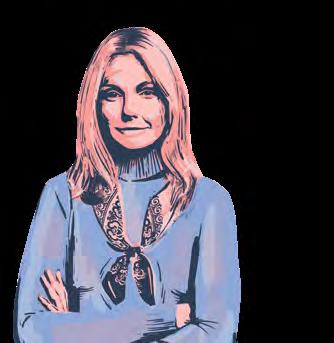



























The days of organisations making vague statements about sustainability are thankfully over. Accountability is being raised with the publication of new laws that tie unsustainable behaviour with high costs. The general society is now so aware of this issue that reports of greenwashing are directly detrimental to a company’s reputation. And so businesses everywhere are rolling up their sleeves – updating their business models, adapting their goals and transforming their processes.
There are also big shake-ups happening at the Wiener Stadtwerke Group! In all areas of the business – energy, mobility, processes and other services – we are working flat out on solutions to counteract climate change. This has been a priority for us for some time now. We are well aware that, as an infrastructure group, we have a great deal of leverage when it comes to sustainability, and thus bear a great deal of responsibility. As a management team, we fully support these positive developments – both for the Wiener Stadtwerke Group, and for our owner, the City of Vienna.
In a Group as broadly based as Wiener Stadtwerke, managing sustainability is a complex task. It requires a wellcoordinated approach. To this end, we have combined our sustainability and innovation management at Group level, as the two are inextricably linked in our eyes. This move works to our advantage today as it means we can decide on
the important things quickly and get them off the ground in a way that is as integrated as it is effective.
Various international frameworks provide us with important guidance when assessing what is important: the Sustainable Development Goals (SDGs), the principles of the UN Global Compact and, since last year, the EU Sustainability Reporting Directive, which will apply from 2025. In 2022, we set up a Group-wide project to optimally prepare ourselves for the new CSRD reporting requirements.
As part of this, we conducted a double materiality analysis for the first time in 2022. This gives us an up-to-date picture of the impact our business activities have on people and the environment. It also gives us a picture of the opportunities and risks for our business performance that arise from environmental developments. We also carried out a climate risk analysis that covers physical and transitory risks. This comprehensive assessment of the current situation enables us to manage the company with a focus on future development.
Only when we know where we stand can we make the right decisions. That is why we attach great importance to sound analyses. Effective governance structures and clear processes are equally as important to us – and we have set ourselves the goal of further improving both in 2023.
The Management Board: Martin Krajcsir and Peter Weinelt (from left to right)
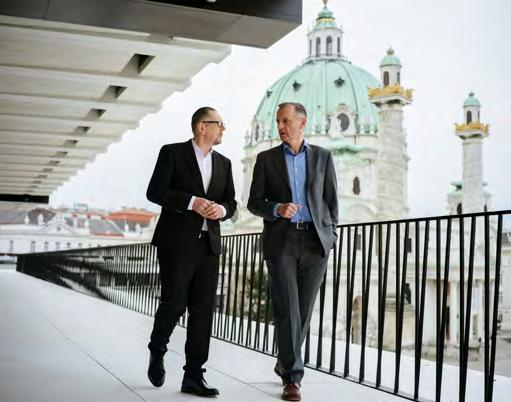
We are standardising our key figures, communicating clear objectives and revising responsibilities, roles and tasks.
You can find out more about these changes and our progress in the field of sustainability on the following pages. We hope you enjoy reading.
Vienna, May 2023
Martin Krajcsir Chief Executive Officer Peter Weinelt Deputy Chief Executive Officer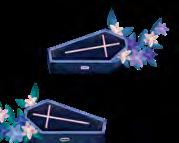
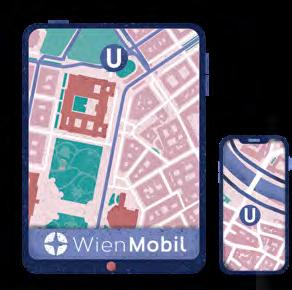



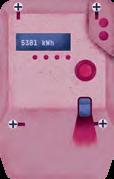
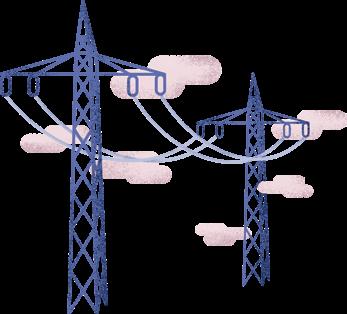
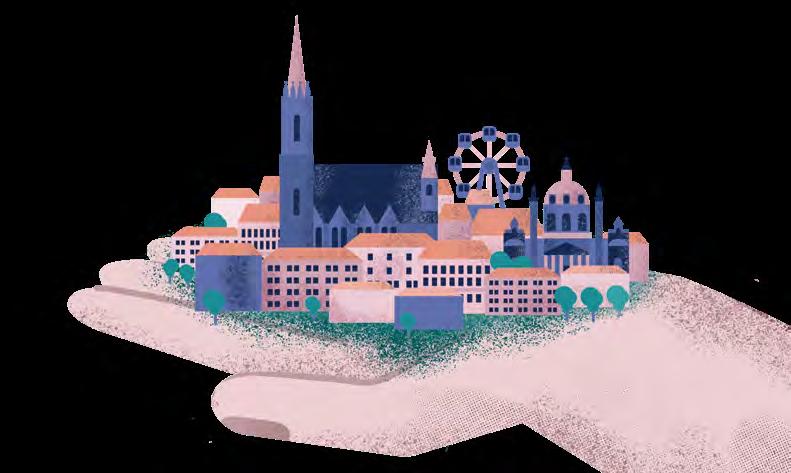

The Wiener Stadtwerke Group knows how to keep Vienna running. And it knows how to lead our liveable city into a good future. Its task is to provide services to everyone in Vienna and drive the climate revolution forward in a targeted manner. It achieves this through a great deal of expertise and passion, targeted investments, and the support of a strong Group.
are combined under the umbrella of Wiener Stadtwerke GmbH. We are headquartered in Vienna. We also operate additional sites and subsidiaries in Burgenland, in Lower Austria and the nearby countries of Hungary, Slovakia and Romania.
On behalf of the City of Vienna, the full owners of the Wiener Stadtwerke Group, we ensure that the essential services are provided. This is a special task of the highest societal importance. Our mission is to provide reliable general access to existentially essential goods and services for all the people of Vienna. With approximately 16,000 employees, we ensure each and every day that the people of Vienna and its economy have round-the-clock access to future-proof services in the areas of energy, mobility, and funeral services and cemeteries. A total of nine strong brands
The Wiener Stadtwerke Group is the largest communal infrastructure service provider and one of the largest employers in Austria. We continuously invest in climate protection, innovation and digitalisation. Our work is significant for the economy while also increasing and ensuring the quality of life of current and future generations. The use of the latest technology and renewable energy sources, the expansion of climate-friendly public transport and efficient networking of information and communication pathways are all ways we are making Vienna fit for the future. An innovative infrastructure and high supply security in the metropolitan area benefit the citizens of Vienna as well as commuters and energy customers in the greater Vienna area. Even corporations, small and medium-sized enterprises and governmental organisations based in Vienna, as well as the many visitors to the city, benefit from this.
Vienna aims to be climate neutral by 2040. The path towards climate neutrality is laid out in the Climate Roadmap of the City of Vienna. It defines specific instruments and measures for counteracting the effects of climate change and preparing for changing conditions. The Climate Roadmap comprises more than 100 measures to ensure that Vienna remains the most liveable city in the world, for all its inhabitants, for decades to come. The focal point of Vienna’s climate policy is the well-being and health of all the people in the city.
The Wiener Stadtwerke Group is an important partner for the city in the implementation of its strategies and programmes – and thus also in the implementation of the Climate Roadmap. We have the power to actively drive forward climate protection in our city. In this, we consider ourselves to be a key sparring partner for the climate department of the City of Vienna, especially in relation to the Vienna Smart Climate City strategy, the city’s overarching umbrella and sustainability strategy. It focuses on making Vienna a sustainable,
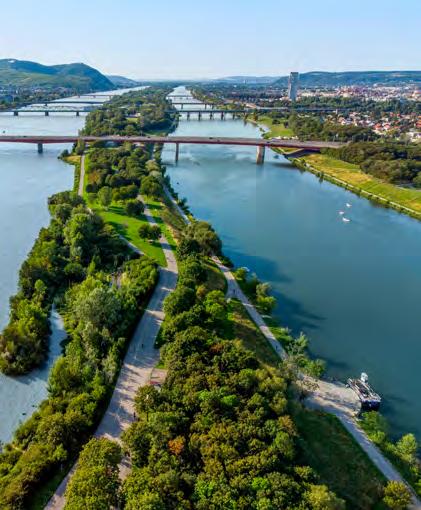
climate-neutral city by 2040, and applies to all of the city’s institutions and municipal enterprises.
The Smart Climate City strategy is aligned with the global Sustainable Development Goals (SDGs) as set out in the UN’s 2030 Agenda for Sustainable Development and defines a total of eleven goals whose themes are intertwined. These include health and inclusion, energy, mobility, construction, the economy and work, and digitalisation. Wiener Stadtwerke is an important partner for implementation. We are able to and want to effect a great deal of change, especially in the areas of infrastructure development, climate protection and innovation promotion.
More information on the Vienna Smart Climate City strategy can be found at: smartcity.wien.gv.at
At the core of our Group strategy are two fundamental tasks: climate protection and ensuring a stable financial basis. Without stable finances, there can be no investments, no high-quality jobs and certainly no proactive, targeted planning aimed at strengthening the company. Without stable finances, there can also be no climate protection. And that is out of the question in Vienna and for Vienna. After all, it’s the cities that produce 75% of global carbon emissions, and that is where the climate revolution will play out. Vienna has a responsibility, and the Wiener Stadtwerke Group is delivering. It is ensuring that all of Vienna’s residents can travel around our city in an environmentally friendly way and that their electricity and heating are increasingly derived from renewable energy. The goal is clear: to be climate neutral by 2040.
Together we will make the climate revolution a reality!
We are the partner for implementing and shaping the traffic revolution for
• Protecting the climate and increasing energy efficiency to reduce carbon emissions as much as possible

• Digitalisation and innovation: using available data to enter new customer segments
• Taking economic, social and ecological responsibility
We make the energy revolution possible: As an innovative driver for expanding renewable energy with a focus on the supply security of the Vienna metropolitan region.
• Securing earnings cash flow
• Maintaining a stable equity ratio
• Maintaining stable financial assets
• Enhance corporate culture, strengthen team spirit and promote cross-company cooperation
• Increase focus on performance and optimise deployment of staff
• Embed innovative thinking and action into the organisational structure
• Use digitalisation to increase internal efficiency (process automation)
• Expand the use of new technologies
• Develop new products and increase customer acquisition
• Establish the central position of Wiener Stadtwerke in all relevant networks
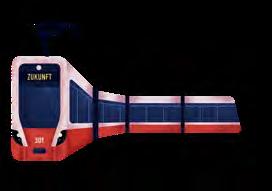
• Secure market position / retain existing customers and acquire new customers / one-stop shop
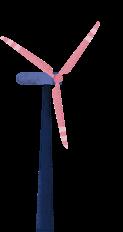
• Develop new joint business models
• Place customers at the centre and meet their needs through stronger collaboration within the Group
We work as a Group and orient ourselves to the needs of our customers. The Wiener Stadtwerke Group wants to be THE one-stop provider of infrastructure services in Vienna. Services that our Group companies provide within the Group are to be offered and billed in a market-focussed manner.
As in recent years, we are focussed on increasing efficiency. We need to continue to reduce costs that we are able to influence, to increase productivity and strengthen our position. That’s only possible with the best employees, and Wiener Stadtwerke has a lot of those.
Our Group strategy includes optimizing the commitment of our employees, also in terms of thinking more about performance and developing the corporate culture to an increased feeling of “us”. A practical example of this is projects such as the facilitation of changing jobs within the Group.
For more information, please refer to the chapter ‘Working at Wiener Stadtwerke’
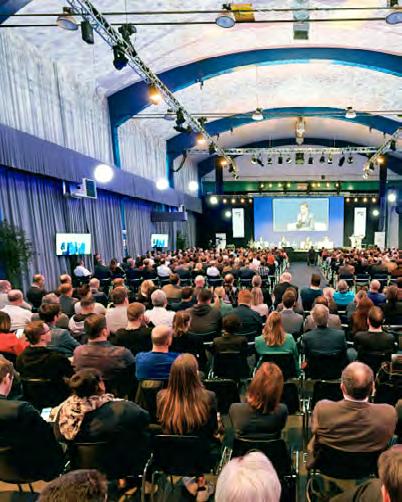
Wiener Stadtwerke GmbH, under the leadership of the Chief Executive Officer Martin Krajcsir and Deputy Chief Executive Officer Peter Weinelt, forms the organisational and strategic umbrella of the Group companies. The Supervisory Boards of these Group companies each contain at least one Management Board member (Chief Executive Officer / Deputy Chief Executive Officer) of Wiener Stadtwerke GmbH. The broadly diversified Group faces widely divergent legal and economic conditions across all Group companies. The individual Group companies are therefore governed on the basis of individually determined targets and key figures.
The selection and hiring at the highest leadership levels in the Group companies is carried out in accordance with the Staffing Act (Stellenbesetzungsgesetz) and generally takes place through a resolution by the shareholders. Suitability in terms of the subject expertise of the applicants is the deciding factor. The members of the top management receive compensation with fixed and variable components. A Group-internal compensation scheme is used for this, which is evaluated using external benchmarks. The variable performance compensation is based on targets that are defined in collaboration with Wiener Stadtwerke GmbH
That is our goal.
as the owners and are derived from the goals of the Group strategy. These targets have not previously been classified according to sustainability criteria.
A detailed overview of the remuneration of the management can be found on page 76 of the Financial Report.
The management teams of the Group companies are regularly in touch with the ownership representatives and Supervisory Board members. Sustainability matters are also a part of this. Special committees that deal specifically with this topic area have not been formed in the past. This is set to change. Wiener Stadtwerke is creating a new ESG Governance, a sustainable corporate leadership, based on the stipulations of the Corporate Sustainability Reporting Directive (CSRD) of the European Union. This will also include positioning sustainability matters more strongly at the highest level of decision-making.
For more information, please refer to the chapter ‘How we lead.’
cles. In addition to its own fleet of vehicles, Wiener Netze also manages the fleets of other Group companies.
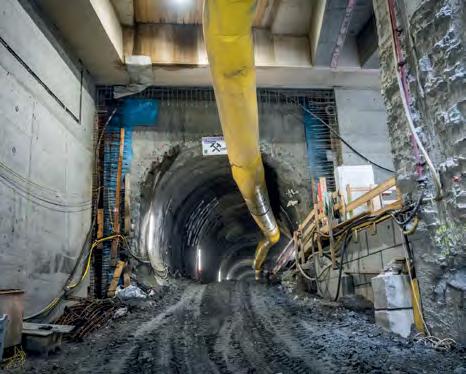
Our
Group ensures reliable, climate-friendly energy and mobility, modern IT solutions and much more. We know how to develop our city together in a holistic and sustainable way. Our Group companies ensure together that life works in our city. Our Group company Wien Energie is responsible for secure and reliable energy supply. The company is Austria’s largest regional energy supplier, and provides roughly two million people and 230,000 businesses and industrial plants with energy. The electricity and heating are produced through combined heat and power plants, waste plants and renewable energy sources such as solar, wind and hydropower, as well as biomass. Over the next few years, district heating will become even more environmentally friendly through the increased use of geothermal energy and waste heat. The share of renewables is being expanded on a massive scale. For Wien Energie, security of supply is the
topmost priority in the supply chain. Along with purchasing energy sources (such as natural gas, waste, heating oil, biomass) from contractual partners in Austria and abroad, a major focus is on the maintenance of plant parks. Strategic purchasing through long-term cooperation with suppliers and contractors ensures the reliable supply of the production sites. Project-based contracts are particularly prevalent in the new construction of electricity production plants such as wind farms, PV plants and large-scale heat pumps. The majority of suppliers and contractors of Wien Energie are in the German-speaking (DACH) countries, which means that Wien Energie makes an important contribution to value creation in the region through regional sourcing.
Wiener Netze is responsible for this energy grid, planning, expanding and operating it. The company is Austria’s largest combined system operator of electricity, gas, district heating and data. Investments of more than EUR 300m per year go into maintaining, modernising and expanding the energy grids. The transition from the classic metering system to smart metering is also one of its core tasks. Wiener Netze also ensures secure energy transportation and achieves 99.99% supply security – a top rate worldwide. In the event that the electricity, gas or district heating systems do experience disruption, roundthe-clock teams are deployed immediately for its customers. The technicians are based all around Vienna with their vehi-
Our public transport is always up and running too. With some 83 kilometres of underground tracks, 227 kilometres of tram tracks and 880 kilometres of bus routes, Wiener Linien manages the largest regional public transport network in Austria. In 2022, more regular customers than ever before travelled using public transport. Roughly 1.17 million passengers using the Vienna public transportation network have an annual pass, a semester ticket, a TOP or youth ticket or a KlimaTicket. Wiener Linien ensures that two million passengers arrive at their destinations quickly, easily and in an environmentally friendly manner every day. For Wiener Linien, what matters isn’t just the energyefficient operation of its fleet. The particularly environmentally friendly Type V underground trains and the new Flexity generation of trams are 90% recyclable at the end of their decades-long useful lives. As a public industry commissioner, sourcing at Wiener Linien is in accordance with the
The things that the people of Vienna need for their daily lives are very diverse –which is why we are also very diversified.
strong
Federal Allocation Act. The primary objects of sourcing are vehicles and their maintenance as well as the construction and maintenance of traffic infrastructure.
As a component of a climatefriendly future, Wiener Linien is combining the broad public transport spectrum with a variety of sharing offers, from bicycles and e-scooters to electric cars with its project *WienMobil*.
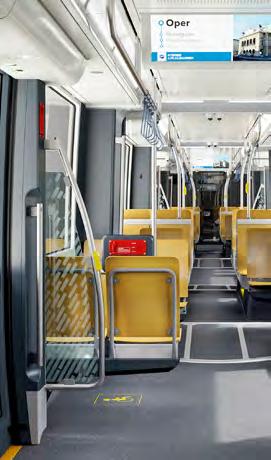
Wiener Lokalbahnen operates the Badner Bahn regional train system in the greater Vienna area as well as numerous bus lines in Baden. Wiener Lokalbahnen Verkehrsdienste (WLV) enables people with restricted mobility to reach their destination safely and in an eco-friendly way in wheelchair-friendly minibuses. Wiener Lokalbahnen is also working on numerous additional services in the area of on-demand transport. After all, tailored transport solutions are part of our timetable for the future. Wiener Lokalbahnen is constantly investing in modernisation and new construction projects to increase the comfort and value for passengers, for example with the new Badner Bahn TW500 vehicle series. Wiener Lokalbahnen also operates cargo transport across Europe through the subsidiary Wiener Lokalbahnen Cargo (WLC).
As one of Vienna’s leading car park operators, Wipark helps to reduce the pressure of parking on the streets and creates the foundations for the greening or repurposing of former parking spots by creating underground parking areas. Its core activities comprise the operation and management of multi-storey and open-air car parks and also plans and carries out the construction projects associated with these. In doing so, Wipark partners with shopping, banking and business centres, cinemas, universities and top hotels in Vienna’s city centre. In addition to prime locations, the portfolio also includes park-and-ride car parks and collective residential car parks. The company operates nearly 80 car parks, with a total of 24,000 parking spaces. At the same time, Wipark is providing a close-knit electromobility network, with more than 450 charging points at Wipark car parks.
Friedhöfe Wien provides solace to grieving families and friends, creating a space for them to remember loved ones and come together. More than 550,000 graves are carefully maintained by experienced team members. Forty-six cemeteries are managed over a total area of roughly 5.2 square kilometres. They provide a place of refuge and recreation for those seeking respite. These natural cemetery spaces are a comfort for plants, animals and people equally.
Friedhöfe Wien is also a trailblazer in terms of digitalisation, for example by enabling the experience of communal remembrance at any time and from anywhere with the digital grave service. With e-bike rentals, horse-drawn carriage rides, concerts and much more, they offer the people of the metropolitan region that special something extra.
Bestattung Wien is Austria’s largest funeral home – and one of the largest in Europe. The company is a trusted partner for funeral services, carrying out approximately 10,000
99.99% supply security is ensured by Wiener Netze.
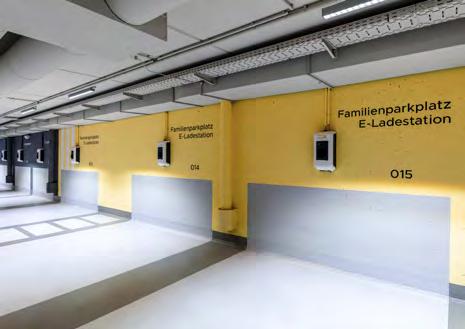
funerals each year. Since its founding, more than two million burials and repatriations all around the world have been carried out. It provides the bereaved with the most personal and uncomplicated support possible. Dismantling taboos surrounding death through education, campaigns and general PR work are also a key objective for the company. The focus of Friedhöfe Wien and Bestattung Wien is always on reliability, integrity and price transparency.
The subsidiary WienIT has been the Wiener Stadtwerke Group’s central IT and business partner since 2003. It provides state-of-the-art technology and ensures that background processes run smoothly, from IT services, technical HR processes and output management through to media
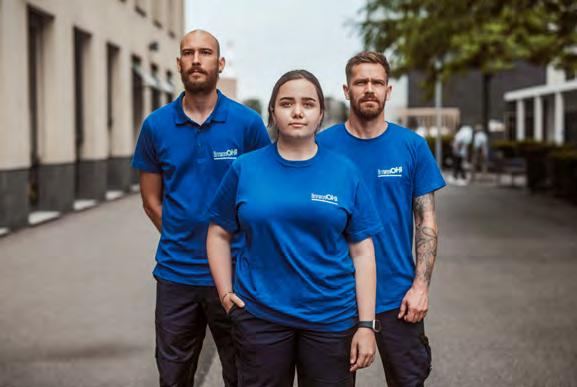
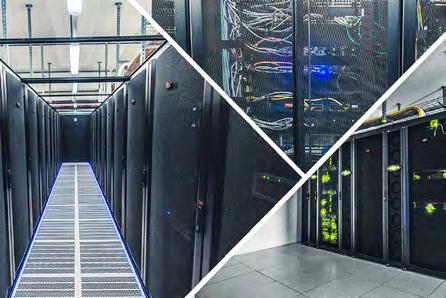
planning. WienIT operates two computer centres, manages some 500 projects annually and supports around 10,000 functions directly and indirectly. With Digi.Lab, WienIT has its own research and development unit that is working today on the ideas of tomorrow, such as augmented and virtual reality.
Digital is also the keyword at the Group subsidiary Upstream Mobility. The communal digital mobility platform connects all of the city’s mobility service providers, electric charging stations and car parks to a digital infrastructure on a single platform. Since 2016, it has been helping public transport providers to offer innovative mobility services that enable passengers to travel sustainably and in a way that is accessible and affordable. The recently introduced, low-threshold digital services and platforms focused on “Mobility as a Service” make daily life easier for many people across the metropolitan region. A breadth of experience, a far-reaching partner network and top experts in data science and visual data analytics make Upstream Mobility a valuable partner for creating innovative analysis tools based on a wide range of data sources.
Our Group companies Facilitycomfort and Hauscomfort provide technical service and first-class infrastructure services for real estate. They manage residential buildings within the Wiener Stadtwerke Group and on behalf of third-party customers. Additionally, Facilitycomfort offers numerous security-related, planning and construction services. They install photovoltaics systems and greened façades, for example. WSTW Immo, a brand of Facilitycomfort and
Gemeinnützige Wohnungs- und Siedlungsgesellschaft ( GWSG ), works solely to create living space for our Group employees. The company redevelops buildings that are no longer needed to fulfil their core purpose into private residential space. From March 2023, the brands Facilitycomfort and Hauscomfort will be branded under the name immOH! Both companies will remain legally independent.
WienIT is driving digitalisation forward.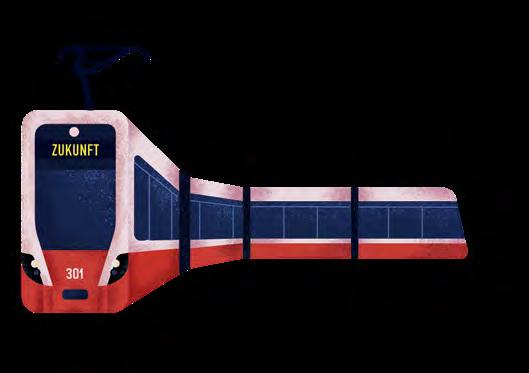
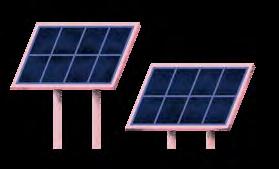
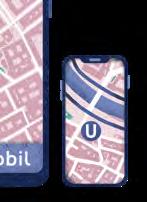
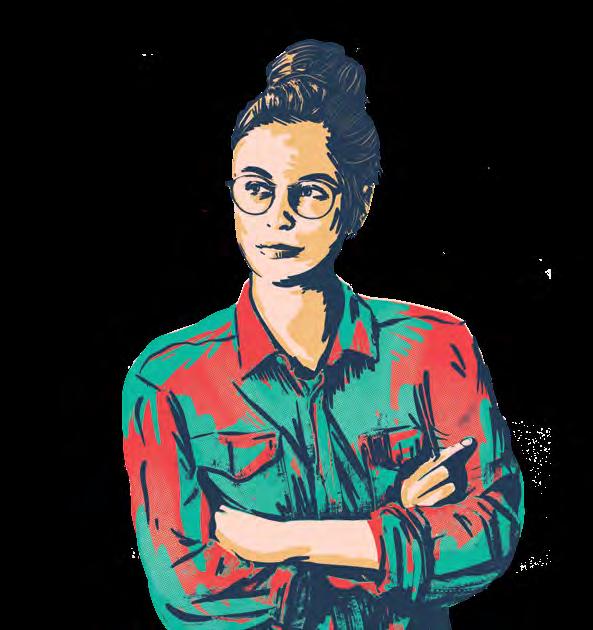
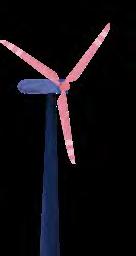
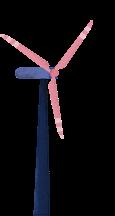
Wiener Stadtwerke has made sustainability one of its core topics. We examine exactly which points are material for us in this context, position ourselves so that we can optimally fulfil the tasks that result from this, and focus above all on our customers.
classify, measure, trace and report our progress and contributions.
The Sustainable Development Goals (SDGs) as well as the principles of the UN Global Compact are important sources of inspiration for us to ensure a liveable future for the people of Vienna and future generations through ideas, research and innovation.
Sustainability – the core of our structure
Infrastructure development, climate protection and innovation – Wiener Stadtwerke has plenty of room to make a difference in these areas. We want to capitalise on these so that we can use innovative solutions to support the City of Vienna and its citizens and to guide them towards a steadily more sustainable future. To do this, we align our activities with the global Sustainable Development Goals (SDGs) and the UN Agenda 2030 for Sustainable Development. We are also a member of the UN Global Compact, the world’s largest and most important initiative for sustainable and responsible corporate leadership. As part of this membership, we report annually on the progress we have made in implementing the ten principles of the Global Compact and what contributions we have made to sustainable development. This annual Communication on Progress (CoP) has taken place via the CoP platform since 2021. It allows us to
Making Vienna climate-neutral by 2040 – that’s not just one of many goals for us. It is our mission. Climate protection and sustainability are the core of our company. This is how we measure our success. That makes it all the more important for Wiener Stadtwerke to have a sustainability management system that is functionally and organisationally rooted in the Group. This has been the case since 2004. In 2017, we combined our sustainability management at the Group level and in many Group companies with our innovation management. The reason for this is clear – innovation and sustainability are inseparable for Wiener Stadtwerke. The close organisational linking of the two allows synergies to now be used optimally.
Our Group-wide strategic innovation and sustainability management falls under the responsibility of the Chief Executive Officer. The innovation management department acts as the coordinator and driver. It is an important hub for a seamless exchange of information about the major topics of the Smart City, innovation, sustainability, trend scouting and idea man-
agement. Our Group companies then decide what shape individual measures should take in order to achieve the Groupwide sustainability targets. Sustainability managers have been appointed within each of the individual companies to oversee this and work closely with the Group management.
We have a lot more planned for the coming years. The previous structure of our sustainability management, including the interfaces to the departments and the Group companies, has proven itself in general, though there is room for development. We will no longer make sustainability a task for individuals but a fixed component of all our activities. From procurement to employer branding, supplier management to capital expenditure, greenhouse gas calculations to training
“We will no longer make sustainability a task for individuals but a fixed component of all our activities.”
Gernot Sauer, Sustainability Manager
measures, sustainability plays an increasingly important role in our decision-making, how we view ourselves and how we present ourselves as a company. And thus it gets exactly the attention it deserves.
To appropriately meet the changing interests of our stakeholders and the continual changes to regulatory frameworks, in 2021, Wiener Stadtwerke began to tie sustainability more closely into core processes, such as risk management and financial reporting.
Divisions: Finances & Mobility
Peter Weinelt Deputy Chief Executive OfficerDivisions: Energy, Human Resources & IT
Sustainability and innovation management
In 2022, with a Group-wide project, we laid the foundations early on for a corporate leadership that will be optimally prepared for the EU Corporate Sustainability Reporting Directive (CSRD1) that will apply from 2025. With an eye toward the future, we have addressed the requirements of the guideline and transformed these into concrete corporate processes. The Taxonomy Regulation,2 which is a central foundation of the EU for the transformation of the economy to a sustainable economy, will also factor into our corporate management in future.
See also the chapter ‘How we lead’.
1 The Corporate Sustainability Reporting Directive is the next step of the NonFinancial Reporting Directive (NFRD) pertaining to the reporting of non-financial and sustainability-specific data and information. It pursues the aim of putting sustainability reporting at the same level as financial reporting and to allow comparability between the sustainability effects of different companies.
2 The EU Taxonomy describes a framework for classifying ecologically sustainable economic activities in a generalised manner. It is associated with in-depth reporting obligations.
Vienna Smart Climate City strategy UN Sustainable Development Goals / UN Global Compact CITY OF VIENNA Implementation OrientationWe also utilised the expertise of an auditing and consulting company that played a consulting role at the political level in the development of the CSRD Guideline and the European Sustainability Reporting Standards3 (ESRS). Together we carried out strategic preparations so that we are set up for the required reporting from 2025 and can adapt the key figures that were previously recorded and published in accordance with GRI to the stipulations of the ESRS. Specifically, as part of a doubled materiality analysis (see the section ‘Materiality analysis’), we identified all the topics of our business activity that have a material impact on people and the environment and, at the same time, showed the risks and opportunities for the business success of Wiener Stadtwerke that result from this. In addition, in 2022 we carried out the first climate risk analysis, which comprises the physical and transitory risks (see section ‘We want to know our climate risks’).
The Group company
Wien Energie is exemplary for how our divisions deploy staff internally to achieve their ambitious climate goals. It’s especially important here to optimise the decision-making and implementation processes in terms of sustainability.
In addition to energy generation, Wien Energie is also positioned sustainably in Governance
3 The European Sustainability Reporting Standards are an integral part of the CSRD. These are unified EU standards for sustainability information that must be applied by companies in their publication of sustainability information.
Wien Energie formed an operational and strategic committee for this purpose in 2022. The strategy committee “Board for Sustainability & Innovation” comprises department heads who make strategic decisions in these areas and make recommendations to the management. Meanwhile, the “Sustainability Task Force” comprises experts from operational areas. They prioritise sustainability topics and handle the implementation of the concrete measures derived from these within the company. In the reporting year, for example, sustainability figures were developed and their monitoring was introduced. The sustainability team of Wien Energie, which has been in place since 2021, prepares the content for the meetings of the operational and strategic committee, support with collaboration and implementation, and is the central point of contact for all matters of sustainability. In addition, Wien Energie has an internal sustainability network that is open to all employees.
A networking event is held each quarter, which employees from all departments of Wien Energie can take part in. They are regularly informed on current matters by the sustainability team and can thus drive the cultural shift within the company. For Wien Energie, this factor is not to be underestimated.
We are rebuilding Vienna to be climate neutral by 2040. This is a challenging undertaking. We can only achieve our goals with competent, knowledgeable and dedicated employees –they are the key to our company’s success. We know that we are competing for the top talents. We also know that Wiener Stadtwerke has a lot to offer. One thing in particu-
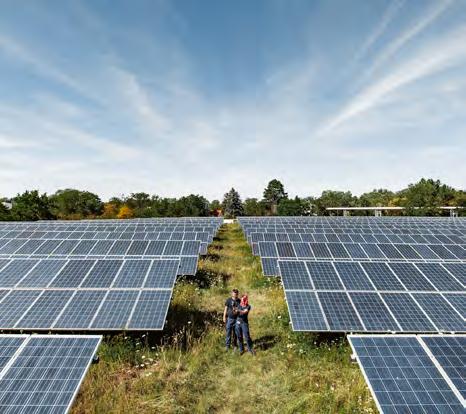
We are actively driving forward an internal cultural shift for the sustainability revolution.
lar: jobs with a purpose. At Wiener Stadtwerke, all employees can be climate pioneers and lead the way on our path towards a lifelong and climate-neutral future. We bring all our employees along for the climate revolution and support them in gaining the knowledge they need for this. Based on this, they can shape sustainable corporate development through discussions and, with their own ideas, can also acquire specific method knowledge and can successfully position the topic of sustainability in the organisation.
The introduction to sustainability takes place with the “Introduction to the world of sustainability” training programme, which covers key basic knowledge. The following training course, “Applied sustainability,” imparts more in-depth information about the development of strategies and their implementation. In “Deep Dives,” one to two-hour digital seminars, the following topics are conveyed:
• Making digitalisation sustainable
• Circular economy: the leverage for a sustainable economy and society
• Sustainable project management
• Sustainable urban mobility – public transportation and complementary mobility in Vienna
• Corporate Sustainability Reporting Directive (CSRD)
• Sustainable project management
• Sustainable Development Goals (SDGs)
The executives are role models – and at Wiener Stadtwerke, they are key multipliers for a successful climate revolution. We view permanently anchoring our central corporate values in structures and processes as a prerequisite for sustainable, value-oriented leadership. We therefore offer our executives a variety of continued education opportunities. ESG aspects have been added increasingly to the
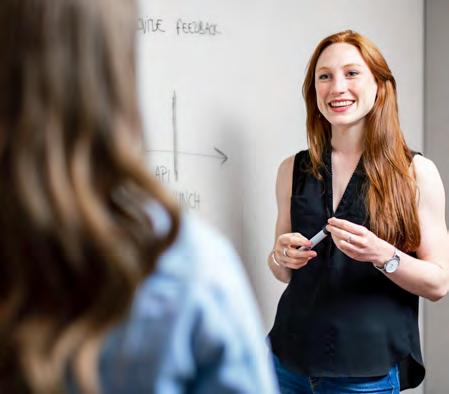
programme developed specially for them. In addition, our executive events, which include the Group topic days, are regularly focussed on climate change and the question of how we can achieve long-term, positive effects as an infrastructure service provider.
We want to manage our corporate goals, which are tailored to the global climate goals, and our measures in relation to the environment, waste and safety in a systematic way. For this reason, the companies of the Wiener Stadtwerke Group have implemented environmental management systems that regulate clearly defined processes for climate protection, quality assurance and quality management as well as occupational health and safety. We consciously avoid standardised, Group-wide management systems. Because of our heterogeneous business areas and the varying organisational structures, these are not conducive to our goals. Instead of this shotgun approach, we therefore use tailored solutions. Our Group companies operate management systems for environmental and occupational protection that are tailored to their individual organisational structures.
Most of the Group companies are certified in accordance with the environmental management systems ISO 14001 or the Eco-Management and Audit Scheme (EMAS). These well-established management systems are required by legislators and by business partners in relation to, for example, calls for tenders or environmental impact assessments. The Group companies are regularly subject to audits and ensure in the run-up to these that they adhere to the high standards for recertification and carry out corresponding process improvements continually.
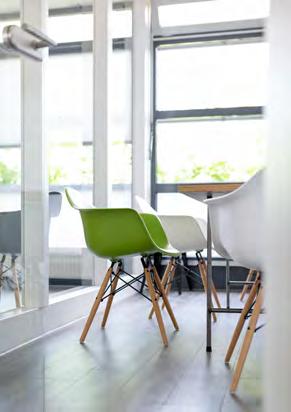
The Wiener Stadtwerke Group is a company that is wholly owned by the City of Vienna. For us, this means that we are wholly dedicated to the people of this city. Beyond this, we also have a series of additional stakeholders with varying expectations and objectives. It is very important to us to know the requirements of all our stakeholders so that we can orient our company activity accordingly. In addition to our customers, we have defined the following stakeholder groups: employees, authorities and administration, banks and insurance companies, suppliers and service providers, media, the press, NGOs, activists and lobbyists, the City of Vienna and politics, science and research as well as our business, cooperation and sales partners.
For the Wiener Stadtwerke Group, being committed to the metropolitan region also means putting the focus on our customers. We regularly carry out customer surveys across all Group companies to assess how happy customers are with our services and to identify areas for improvement. The overall aim of our surveys is to continuously improve the quality of our service and our customer communication in general – not least in order to systematically reduce the number of complaints that the complaint management teams in our individual Group companies receive. With this culture of reporting and providing feedback, we have successfully kicked off a continual improvement process.
The “Öffi-Denkwerkstatt”, which was created in 2022 as the next step from the former customer liaison team, enables direct dialogue with Wiener Linien customers. It allows any customer of Wiener Linien who wishes to, regardless of age, previous knowledge or availability, to join in through various formats – from online surveys to multi-level workshops – and develop new products cooperatively and improve existing services together with Wiener Linien. Since its launch, more than 800 individuals have registered to participate. Wien Energie also involves its customers as the occasion arises through market research or, for example, through focus group discussions.
No doubt about it: qualified and motivated employees are a crucial success factor for any company. For us, they are key stakeholders. In an age of a shortage of skilled workers, the Wiener Stadtwerke Group is working diligently to find qualified employees and entice them to join the company – and
we work hard to ensure that they want to stay. We believe that responsible, future-oriented corporate management is also measured by how happy people are with their jobs and their employers. Regular Group-wide surveys of our employees (see also the chapters on ‘Materiality analysis’ and ‘Corporate culture’) provide important insight into the current interests of our employees. We gain valuable insight from which we can initiate impactful measures and positive change. The 2022 survey had a participation rate of 75%, which was 17% more than in 2019. We achieved very good results especially in the areas of employee dedication and
Since its launch, more than 800 individuals have already registered to participate in the Öffi-Denkwerkstatt.
“The Wiener Stadtwerke Group is a company that is wholly owned by the City of Vienna. Providing the best possible services for the climate and the residents of our city is a mission we take very seriously.”
Peter Weinelt, Deputy Chief Executive Officer
employer satisfaction – both key figures improved over the last survey in 2019. We also believe conversation to be decisive – continual dialogue between employees and their leadership plays an important role at Wiener Stadtwerke. This communication is firmly rooted in the leadership principles of Wiener Stadtwerke.
We also maintain continual contact with further stakeholders. The management teams of our Group companies are regularly in touch with the owners and Supervisory Board members. Experts from the political sphere, science, business and society are also in dialogue with us throughout the year. These volunteer experts are selected and nominated with approval from the Management Board of the Wiener Stadtwerke Group based on their expertise, strategic fit and availability. Stakeholders are contacted through various channels such as by post, newsletters and social media, and are specifically encouraged to engage in active dialogue with us. Beyond this, Wiener Stadtwerke is involved in numerous external organisations, interest groups and associations.
When it comes to sustainability as well, Wiener Stadtwerke aims to engage in open, constructive dialogue with its stakeholders. For this reason, we held our annual stakeholder breakfast again in October 2022. It took place in the newly opened Climate Lab, which offers the ideal space for networking, chatting and exchanging information. The participants got a first look at the new key sustainability topics that we defined together with our stakeholder groups in accordance with the new ESRS (see chapter on ’Materiality analysis‘). Teams made up of a variety of members including representatives of the Vienna Social Fund, Young Caritas, the Vienna Environmental Advocacy, the consulting firm PwC, the climate department of the City of Vienna as well as customers of Wiener Linien and Group employees shared their thoughts on the future ESG management of the Group.
The Wiener Stadtwerke Group’s role as a pioneer in the fight against climate change and driving the energy revolution, which is already significant in the eyes of the participants and will continue to grow, was underscored. At the conclusion of the Stakeholder event, participants were
given an exclusive tour of the Climate Lab, where the climate innovations of the future are being developed. Another task of the Climate Lab is increasingly bringing various stakeholders together to encourage interdisciplinary synergies.
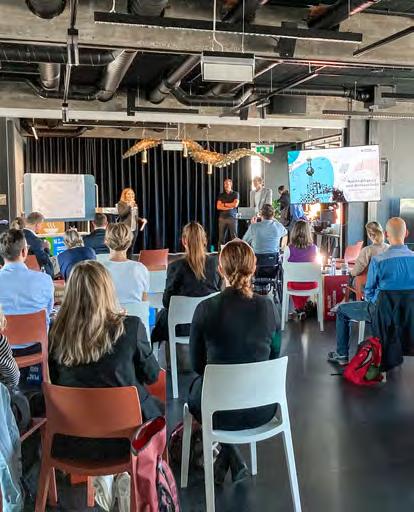
From the 2025 financial year on, Wiener Stadtwerke will be required to record and publish its non-financial and sustainability-specific data and information in accordance with the CSRD, which will go into effect then. Our task is to determine before then which topics are material for our company and thus to be reported. The double materiality concept is used for this. In accordance with double materiality, topics are reportable for WSTW in which our business activities have effects on stakeholder groups as well as the environment and nature (known as inside materiality or the “inside-out” effect), as well as topics that affect the financial situation of our company and our corporate value (known as financial materiality or the “outside-in” effect).
The new ESRSs describe 23 material cross-sector topics, of which a selection is to be determined to be material for a company. The materiality analysis of Wiener Stadtwerke was carried out based the ESRS draft that was valid in April 2022. At this time, a reverse onus was stipulated for the selection of material topics. This means that a topic must always be included in the selection if there was no evidence that it truly is immaterial. This reverse onus is no longer applicable. There would likely be fewer topics to report for Wiener Stadtwerke in accordance with the current draft.
To determine the impact materiality, that is the sustainability effects of our business activity to the outside, we carried out qualitative focus interviews with representatives from all Group companies to validate value chains and identify stakeholder groups along the value chains. Following this, a survey tool was used to survey 845 internal and external stakeholders, including the leadership team, on their assessment of the 23 topics. In addition, more than 50 representatives from different departments of our Group companies evaluated the topics based on their effects on the environment and society in Group-wide workshops. Following this, the business relevance of the topics and their financial materiality were determined in the individual Group companies in a workshop using an Excel questionnaire.
Seventeen strategic sustainability topics that are material4 for the Wiener Stadtwerke Group can be derived from the results through an intensive, detailed selection process. These are six environmental, seven social and four governance topics, illustrated in the following graphic:
4 The topics in the materiality matrix marked in grey have been classified as immaterial as a result of the analysis.
Our new process means that the topics defined as material now are very different from the results of the previous materiality analysis from 2018. This also means that the previous three areas of action from the sustainability reporting –“Committed to the metropolitan region”, “Committed to the environment”, “Committed to society” – are being strategically revised. The focus here will be the positioning of our company toward Environmental, Social and Governance (ESG).
The process as well as the results of the two-fold materiality analysis and thus the material topics to be reported on in future were introduced at a management meeting. The management of all Group companies were present and confirmed the topics unanimously. For the management of the Wiener Stadtwerke companies, these result in strategic areas of action that can be used to orient future corporate development.
The companies of our Group are committed to developing innovations. Together they look for new solutions, try these out in a structured manner and create offers that make sense. They work for a sustainable future for the Vienna metropolitan region. For enthusiastic people. For the Wiener Stadtwerke Group.
Wiener Stadtwerke launched and implemented numerous projects in 2022 as well, from major future projects such as the expansion of the U2xU5 public transport interchange
and its research into the potential of green hydrogen to smaller projects such as initiatives for green spaces. Sustainable plans, research and innovation projects with ecological and / or an emphasis on social added value are assessed as part of Group-wide monitoring. A project overview can be found in the FTIN5 booklet that was previously communicated throughout the Group twice a year. In 2022, this was developed into a digital dashboard. The Group management thus has an up-to-date comprehensive overview of the Group-internal research, innovation and sustainability activities. This digital instrument is significantly more than a planning and steering instrument: it is a key component of raising awareness and communicating with our internal and external stakeholders. The dashboard means that a collection, illustration and evaluation of innovative and sustainable projects is available at just a click of a button, which can also serve as an example for digitalisation in the Wiener Stadtwerke Group.
Of the 263 projects (51 idea projects, 53 research projects, 86 innovation projects and 73 sustainability projects) that were worked on in 2022 throughout the Group, all can be allocated to the three pillars of sustainability – Environmental, Social, Governance (ESG). 97 projects address environmental topics, 61 address social aspects and 105 are governance matters. In general, it can be said that the battle against climate change is carried out at the Wiener Stadtwerke Group to a large extent through the possibilities of digitalisation and a conscious focus on customers. This also applies to the Wiener Stadtwerke climate fund, which
we use to support initiatives to protect the environment and the climate. In 2022, the fund was used to support 21 projects across the Group with a total of EUR 960,037.
5 Research, technology, innovation and sustainability

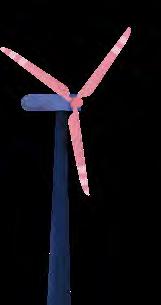
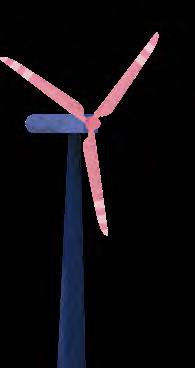
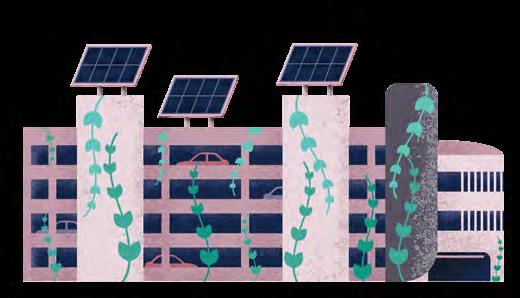
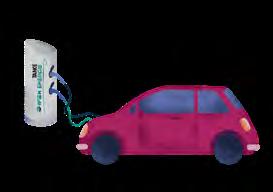
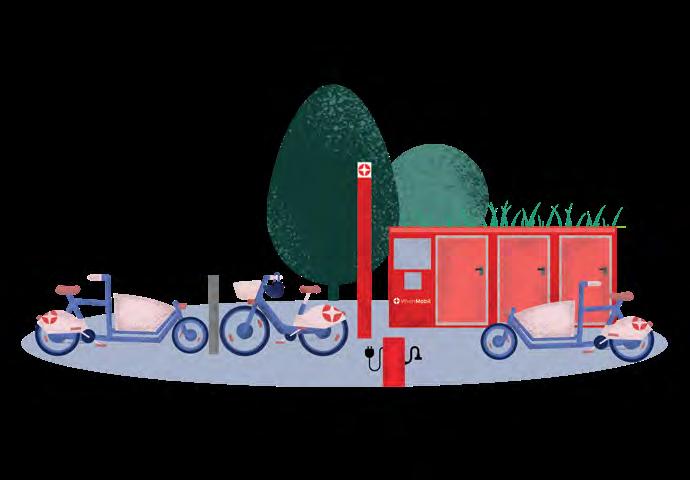
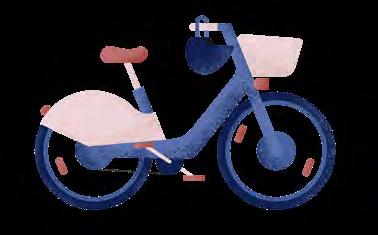
We are doing everything in our power to achieve our goal of climate neutrality by 2040. This applies in particular to our products and services for customers, but also our internal processes.
Greenhouse gases: calculating them, assessing them, reducing them
It’s clear what needs to be done. For Vienna to be climate neutral by 2040, we have to increase energy efficiency, expand the share of renewable energy and continually reduce greenhouse gas emissions. That’s exactly what Wiener Stadtwerke has set itself as a goal.
We’ve got help on our path to decarbonisation in the form of precise, transparent emissions accounting. In 2021/2022, we developed a Group-wide guideline, the Carbon Rule Book, akin to the Greenhouse Gas Protocol, the globally recognised standard for measuring greenhouse gas emissions. The guideline is updated annually. The standard defines, among other things, which accounting approaches and limits as well as which emissions factors in Scope 1 to Scope 3 are used for each reporting year. The Carbon Rule Book of Wiener Stadtwerke stipulates that all Group companies contained in
the scope of consolidation of the financial and sustainability reporting must create a greenhouse gas balance. For the companies Wien Energie, Wiener Linien and Wiener Netze, the balance is to be created for all three scopes. The additional Group companies can opt to assess Scope 3. Scope 1 and Scope 2 are obligatory for them. Our rule book also takes into consideration the peculiarity that the Wiener Stadtwerke Group includes the energy-producing company that supplies energy to the other companies of the Group. In addition, Wiener Stadtwerke will develop a greenhouse gas governance policy and a Group guideline, thus ensuring that regulations are binding throughout the Group. We believe that a standardised process and term definition is needed throughout Wiener Stadtwerke to achieve the goal of operational climate neutrality by 2040.
In 2022, we assessed Group-wide Scope 1–3 emissions for the first time for 2021. Knowing the emissions in the consolidated Group companies is an important starting point for us on the path to reducing emissions. With a view to
the revised version of the European directive on sustainable reporting, the Wiener Stadtwerke Group will publish its key emissions figures annually as part of its sustainability reporting. The governance required for this is currently being laid out in approval with all Group companies.
For more information, please refer to the chapter ‘Governance’.
The direct greenhouse gas emissions of Wiener Stadtwerke (Scope 1 emissions) primarily include the release of CO2 from fossil fuels. All our greenhouse gas emissions are converted to CO2 equivalents based on their greenhouse effect potential using the freely available conversion factors of the Environment Agency Austria. Another key source are the “Standard factors for fuels from the national greenhouse gas inventory for use for level 2a in Austria” of the Federal Ministry for Climate Action, Environment, Energy, Mobility, Innovation and Technology (BMK). The overwhelming majority of these stem from the combined generation of power and district heating in the combined heat and power plants that are operated using natural gas. In addition, CO2 emis-
Indirect emissions from the supply chain (such as electricity, gas and district heating delivery to customers)
sions result from fossil-fuel-burning heating plants, the three energy-from-waste plants owned by Wien Energie, and, to a small extent, from the burning of auxiliary fossil fuels in the forest biomass plant in Simmering. But the Transport division also uses fossil fuels such as diesel and thus contributes to the Group’s direct CO2 emissions. Wiener Netze fleet management measures the utilisation of the Group fleet in its electronic system to a large extent.
The electricity and gas consumption of Wiener Stadtwerke is measured through data collection by Wiener Netze using Smart Meters as well as electricity and gas meters that must be read manually at each of the Group company sites. The same applies to district heating and cooling. The data is
transmitted to Wien Energie for calculation. The consumption noted on the monthly invoices is then used to calculate Scope 1–3.
As the largest emitter of the Wiener Stadtwerke Group, Wien Energie created a climate protection roadmap in 2022 with concrete measures for the path to climate neutrality by 2040. We are currently working in this context on a standardised accounting process, a unified definition of climate neutrality and an accounting process that is in line with the financial reporting.
The Wiener Stadtwerke Group plays an important role in the implementation of the Vienna Smart Klima City strategy. We have the most leverage for a successful climate revolution, after all. We ensure solutions for energy supply and mobility that conserve the climate and protect the environment. Wien Energie has made it its goal to decarbonise its own electricity production by 2040 and is expanding renewable energy and reducing fossil fuels to do so. To drive resource-conserving energy supply forward, Wien Energie is also pushing the use of combined heat and power plants that produce both at the same time. This means significantly reduced primary energy is needed as well as separate provision. The source of the electricity is guaranteed through guarantees of origin, which ensure that Wien Energie does not purchase or distribute any nuclear power.
Wien Energie also expanded its renewable energy significantly in 2022. 43 photovoltaics plants went into operation. This equals an increase of 19% of solar power production. Wind energy production was also increased by 10.5% in 2022. In addition, eight new wind power plants entered into operation in 2022. The wind and photovoltaics plants constructed
in 2022 produce a total of 80,000 megawatt hours of green energy – this equals the annual electricity consumption of more than 40,000 Viennese households.
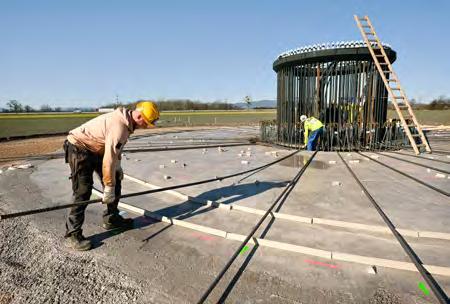
The major projects include the construction of the Trumau wind park, which produces green energy for roughly 14,600 Lower Austrian households. With the completion of this park, Wien Energie has surpassed the 200 megawatt mark with its installed wind power output and now operates 92 windmills in 18 wind parks with a total output of 217 megawatts. Wien Energie has more than tripled its wind power output in the past ten years.
Solar energy is a highly suitable form of renewable energy for cities. We are using it increasingly to do our part in achieving the EU’s climate goals for 2030. In the previous year, solar power plants were expanded with an output of roughly 26 megawatts. Wien Energie now operates more than 370 photovoltaics plants with a total output of
111 megawatts. As part of the solar initiative of the City of Vienna, in 2022 solar panels were installed on the roofs of municipal departments as well as schools, Wiener Linien and nursing homes, and several other buildings.
District heating from 100% regional, renewable sources will be produced by a powerful large-scale heat pump at the site of the ebswien sewage plant Simmering. The highly modern plant is a major contributor to achieving the climate goals of the City of Vienna. A large-scale heat pump with an output of 55 megawatts will supply up to 56,000 households with environmentally friendly heating from mid-2023. It will be fully expanded to an output of 110 megawatts by 2027. Wien Energie aims to operate its district heating entirely with energy from renewable sources by 2040. The use of industrial waste heat and deep geothermal heat will also contribute to the decarbonisation of district heating.
~56,000 households will be supplied with environmentally friendly heat by the heat pump with an output of 55 megawatts.
Renewable resources are important, as is conserving energy. Wien Energie supports customers here with a variety of services. The spectrum ranges from ammeter rental to energy audits and the introduction of a corporate energy management system in accordance with ISO 50001.
With the Climate Lab, Wien Energie has also created a unique climate innovation ecosystem in Spittelau to run meaningful projects for the goal of achieving climate neutrality by 2040. The project partners include Wiener Linien, the Austrian Climate and Energy Fund, Climate and Energy Fund, EIT Climate-KIC – Europe’s largest network for climate-friendly innovations – and Impact Hub, a global network for smaller companies and freelancers. Since the opening in autumn of 2022, the company will drive innovation projects together with key players, such as companies, start-ups and public institutes. Wien Energie has also engaged in direct partnerships with strategically promising start-ups since 2019. In the past financial year, the emphasis here was on energy, mobility and buildings. In the reporting year, Wien Energie was particularly successful with regard to geothermal research and green gases. The company is working with its
partner ARE Austria Real Estate in the future quarter “Village im Dritten” to drive forward “the future of urban living”.
Without investments in the grids of the future, the energy revolution cannot succeed, nor will we be able to maintain reliable energy supply.
Wiener Netze therefore invests roughly 300 million euros in the expansion and maintenance of the electricity, gas and district heating network. This ensures the high supply security of 99.99% in future as well, making the grids fit for renewable energy. This requires a stable energy grid.
Wiener Netze is investing roughly EUR 140m in three substations: a new switching station in Simmering, a new substation at Alberner Hafen and the modernisation of the West substation. In 2022, construction began on the circuit of the 380,000 volt lines in Simmering, which helps to enable the sustainable supply of green energy.
The digitalisation of the energy grid to a smart grid was also driven forward in 2022. At the end of the year, nearly half of all households in our supply area were equipped with smart
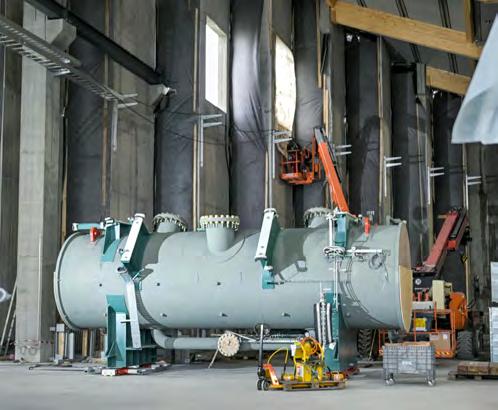
meters. Of our 11,000 transformer substations, 250 are now “smart” and can be operated remotely. We also use the latest technology for troubleshooting in overhead powerlines and for monitoring optical fibre cables. New functionalities are being tested and perfected in a company-owned laboratory, the Smart Grid Lab.
Wiener Linien’s trams, underground trains and e-buses are all electric. And this electricity comes entirely from renew able energy sources. 80% of all public transport passengers are thus travelling using electric power, with this share on the rise. But we’re not stopping there: with special training and continued education, we support all our drivers with energy-conserving driving. The speed of underground trains is automatically optimised by a computer. Using brake energy systems in some underground stations, the energy that is recovered when a vehicle brakes is fed back into the grid and can be used to power station elements such as escalators, lighting and lifts.
tems have long been a focus. We are purchasing 60 electric buses and ten hydrogen buses, building the charging and filling infrastructure required for these and will convert ten lines to emission-free drive by 2025 – in addition to the two existing lines. A competence centre for electromobility is being constructed in the south of Vienna, where electric buses will be charged, maintained and repaired.
Friedhöfe Wien is also making the switch to e-mobility. The diesel bus that took visitors across the broad expanse of the central cemetery for decades was replaced in 2022 with an electric bus. Visitors can also use e-bikes. The electricity for operating these vehicles comes from the photovoltaics and the citizens’ solar plant on the cemetery grounds.
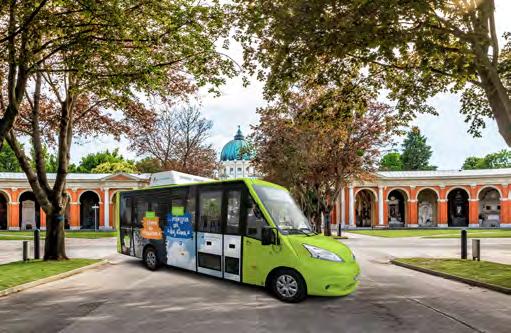
Another focus of Wiener Netze is on green hydrogen technology. In 2022, in partnership with Wien Energie construction began on the first municipal hydrogen plant in Simmering, which will produce up to 1,300 kg of green hydrogen daily from green energy from summer 2023. This is used by Wiener Linien to operate its hydrogen buses. Feeding it into the gas grid for industrial and commercial use and use in combined heat and power plants are also being tested.
Those who switch from their car to public transport save up to 1,500 kg of CO2 emissions each year and roughly 8,300 km of driving. We make it easier to switch by making public transportation more and more attractive. The U2xU5 expansion is the largest climate protection and infrastructure project in Vienna. Twelve new underground stations in the final phase of construction will provide faster connections and more space for more passengers.
A new photovoltaic plant ensures even greener public transport. Wien Energie put this into operation on the roof of the Wiener Linien main workshop as part of the solar initiative of the City of Vienna. The electricity is used directly in the workshop and can cover up to 30% of the electricity needs of the workshop in summer.
In the ongoing modernisation of the diesel bus fleet, we pay close attention to energy efficiency, the lowest possible emissions, staying significantly below the Euro 6 standard, economic viability, and a high level of passenger comfort. In terms of procuring new vehicles, environmentally friendly drive sys-
Wiener Linien makes flexible, sustainable mobility possible in all of Vienna with more than 30 WienMobil stations – from car sharing and bike sharing to bicycle service stations. By 2023, there are to be 100 stations.
At WienMobil Auto, more than 10,000 bookings were made and over 500,000 kilometres were driven in 2022. In 2023, the electric car sharing fleet will be expanded from 50 to 100 vehicles in all districts of Vienna. The bike sharing service WienMobil Rad, which replaced the previous Citybike stations in 2022, offers 230 active locations with 3,000 bicycles – for the first time now in all 23 districts. In 2022, the WienMobil bikes were borrowed more than 240,000 times.
The new electric bus at the Central Cemetery transports passengers using solar power and was initiated in collaboration with Wiener Lokalbahnen.A series of Wiener Lokalbahnen projects also address climate protection. The service OnDemand has been supporting communities since 2021 with digital coordination services for last-mile / first-mile services, such as dial-a-ride taxis, on-call buses and shuttles. The easymobil app, which has an integrated on-demand feature, provides digital support for the services and is a cornerstone for the expansion of public transport services in rural areas and for facilitating the switch from driving to environmentally friendly transport options.
To make electromobility in Vienna a success story, basic availability of public charging stations is essential. Wipark
is therefore expanding its network of charging stations continually and has installed more than 450 charging stations in parking garages in Vienna, with 150 additional charging stations being implemented.
Climate protection: we’re starting with ourselves The Group companies are all continually monitoring where they can further reduce their own ecological footprint.
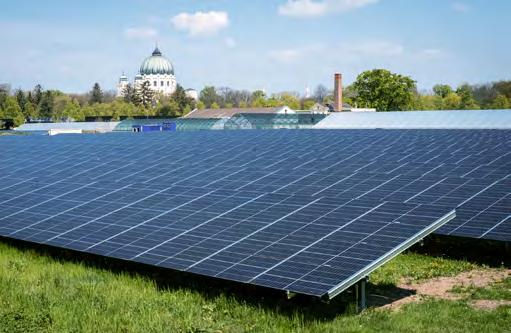
Each company has implemented its own measures, banking on different emphasis areas. This could include:
• Reducing the room temperature in offices
• Low-energy LED lighting
• Smart heating and cooling systems
• Installing motion detectors
• Energy monitors
• Switching to green energy
• Turning off unused refrigerators and monitors
• Automatic standby in coffee machines
In addition, in 2022 Wien Energie replaced about half of the sewage sludge centrifuges in the power plants, which will save more than 50% of the energy required in future. At Wiener Netze, the PV modules at the Simmering site were expanded further and the fleet has been adapted to include 56 vehicles with electric drives. Wiener Linien also lowered the temperature in undergrounds and trams by two degrees and continued conversion to LED lighting in stations and vehicles. Wiener Lokalbahnen rolled out e-scooter sharing at its company premises in 2022, for example, and Wien IT uses the waste heat from its data centres for heating. Timers on info screens have also had a positive effect here.
The 29th solar power station for citizens provides good energy at our cemetery grounds. Situated in close proximity to the workshops and greenhouses, the power station produces enough climate-friendly solar power to supply 570 households. Part of this energy is used on-site, and the people of Vienna also benefit from the photovoltaics project. After the completion in spring 2022, roughly 2,000 “sun packages” were sold.
In 2022, Wiener Stadtwerke carried out a climate risk analysis for the first time, assessing the scenarios of 1.5 degrees for transitory2 risks and four degrees for physical3 risks. The transitory risks and the investment costs derived from this by 2050 were calculated for Wien Energie, Wiener Netze and Wiener Linien. A calculation of potential anticipated damages in relation to physical risks until 2100 was carried out for the sites of the Group companies Wien Energie, Wiener Netze, Wiener Linien, Wiener Lokalbahnen, Wipark, Bestattung & Friedhöfe and WienIT.
2 Transitory climate risks for companies arise from climate policy measures that are aimed at a low-carbon economy, such as a tightening of the emissions marketplace, a carbon tax, stricter efficiency regulations and promoting future-ready technology. These have indirect or delayed effects.
3 Physical climate risks for companies can be acute, such as heavy storms, floods, torrential rains, droughts, water shortages and heat. Chronic physical risks are triggered by long-term climate change with continually higher temperatures and chronic heat waves.
The risk considerations included damage from floods, fires, heat waves, storms and droughts.
The calculations are based on a climate risk tool, the scenarios of the International Energy Agency (IEA) and the key financial figures of the Group companies. The Group-wide risk management takes climate risks into account for the economic planning for 2024 for the first time. Additional information about methods, calculations and more will be reported in 2026 in accordance with the CSRD standards for the 2025 financial year.
Clean air to breathe – this is often hard to get in big cities in particular. According to the United Nations, up to 90% of people around the world breathe in polluted air, which leads to about seven million premature deaths each year. In Europe, an EU regulation on air quality and clean air defines thresholds, limits and targets for pollutants such as sulphur dioxide, nitrogen dioxide, fine particulates, lead,
benzene and carbon monoxide. And in Vienna? Here, the Wiener Stadtwerke Group helps by improving the quality of the air and keeping it free of pollutants. We know that the people of Vienna live off their love for the city – and off the air they breathe in Vienna.
tion Ordinance; the exhaust produced is well below the limit. The pollutant concentrations of the three Wien Energie energy-from-waste plants are documented online almost in real time. www.wienenergie.at The plants are also validated in accordance with EMAS.4 The annual harmful emissions are illustrated transparently in the Wien Energie Environmental Declaration.5 dokumente.wienenergie.at
For new construction, renovations and modernisations of Wien Energie plants, the top priority – from strategic planning through to construction monitoring – is optimal operations throughout the plants’ entire lifespans. The combined heat and power plants we use, for example, achieve higher output with lower emissions compared to power plants that burn fuels. Thanks to their flue gas cleaning systems, all plants prevent fine particulates so efficiently that the amount of particulates in the waste gas from these systems is significantly lower than the exhaust gas from driving. Critical pollutants in the exhaust from thermal waste treatment and power plants are constantly monitored. The legally permissible air pollutant levels from the waste incinerators are defined in the Waste Incinera-
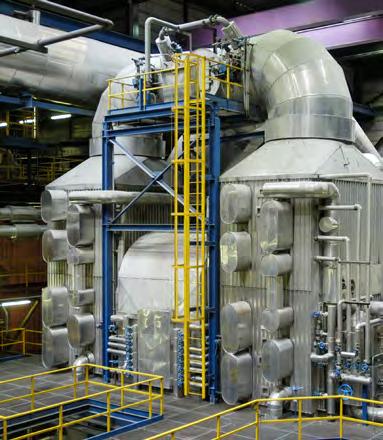
In Vienna, as in most major cities, road traffic is by far the largest source of fine particulates and nitrogen oxide. And its proportion would be significantly larger if so many people did not travel by foot, bicycle or public transportation. With the continual expansion and ongoing modernisation of Vienna’s public transport system and innovative mobility offers, Wiener Linien is making a considerable contribution to protecting the environment and preventing fine particulates and nitrogen oxide from entering the atmosphere. The city’s underground helps to reduce car traffic in the inner-city areas by over 22%.
Green environment, clean air
Meadows, parks, vineyards, forests, fields and gardens: thanks to Wienerwald and Donau-Auen, almost half of the total area of Vienna is greenspace. This makes Vienna one of the greenest cities in the world. And green oases improve the air quality.
4 EMAS stands for Eco-Management and Audit Scheme.
5 The Wien Energie Environmental Declaration shows the continual climate protection efforts of the company. With the preparation of this comprehensive data material on the environmental performance of all its Austrian thermal recycling plants, combined heat and power (CHP), district heating plants, photovoltaics plants and wind plants, Wien Energie is again proving its role as a pioneer as the largest regional energy services provider. The environmental declaration is updated annually and can be downloaded from the website. www.wienenergie.at
500 hectares of space, some 30,000 trees and 140,000 m² of natural meadows make the 46 cemeteries an important factor for the city’s climate.
of Friedhöfe Wien GmbH are also an important factor for the climate of the city in the age of climate change and urban heat pockets. The 46 cemeteries comprise roughly 1.2% of the total city area. With 500 hectares of space, roughly 30,000 trees and 140,000 square metres of natural meadows, they are a valuable local area for rest and relaxation. A conscious approach to the environment and sustainability is at the forefront here. We consider the flora and fauna to be a key part of our cemeteries. This also includes the natural approach to maintaining these spaces.
Since February 2022, Friedhöfe Wien has been working with the Institute of Meteorology and Climatology (BOKU-Met) and the Austrian Institute of Technology (AIT) on a project that is examining the effects of Vienna’s cemeteries on the

local climate of Vienna. On the one hand, it measures how the different structures within the cemetery affect the microclimate. On the other hand, it measures the effect of the cemetery on the microclimate of the surrounding parts of the city. Using these meteorological measurements, the students of BOKU-Met are creating a model of the microclimate in and around the cemetery in Meidling and in Sievering using the urban climate model ENVIMET. Using the exact map of the cemetery and the measurements, the model can be optimised and calibrated to provide an illustration of the microclimate that is as precise as possible.
The finiteness of natural resources as well as the social and ecological consequences of mining materials can lead to only one conclusion: economic growth must be decoupled from the consumption of resources. This, in turn, makes the development of a circular economy a central topic for the future.
As a regional energy supply company and the largest waste processor in Austria, Wien Energie has set itself the goal of taking a pioneering role in terms of the circular economy and to support the transformation of Austria and the City of Vienna toward a sustainable economy.
In addition to the heating revolution and the continued digitalisation, the development of a circular economy is one of our most important strategic goals for the coming years. To facilitate the transition to a circular economy model, Wien Energie
created the department for circular economy and sustainability solutions in 2022, which is dedicated to one goal – creating a comprehensive circular economy by 2040. Wien Energie is taking a holistic approach here. This includes closing the loops in energy, material and substance cycles along the value chain, increasing the share of secondary raw materials and resource efficiency. This will also reduce Wien Energie’s costs, provide resource security in the long-term and contribute to decarbonisation. Recognising far-reaching opportunities to tap new business models and growth perspectives in the medium term is a key driver for Wien Energie.
Complementary to this, the Circularity Lab founded in 2022 as part of the Climate Lab spearheads innovation and cross-sector collaboration. Synergies will be utilised here, with new solutions for the circular economy being implemented together here.
One current lighthouse project is the recycling of phosphor and other materials from sludge ash. The modern sludge incineration of Wien Energie already makes an important contribution today to decarbonisation and will also make it possible in future to efficiently reclaim phosphor, calcium, iron, aluminium and sand from the ash that occurs from this process. Initial feasibility studies confirm a high potential for the implementation of an ash recycling plant in Vienna.
The circular economy also plays a key role at Wiener Linien. We are evaluating opportunities for how the circular economy can be accelerated in numerous projects. We are analysing which ecological benefits would arise from the implementation of individual measures and how high the corresponding economic costs would be.
Furthermore, Wiener Linien is working on improving resource efficiency in infrastructure projects.
A current project is addressing the use of recycling materials in the upper part of the road structure. It aims to explore opportunities for recirculation of materials in superstructure projects. The planners and construction divisions of Wiener Linien support these processes and test these new insights in practice.
The pilot plant Waste2Value, in which waste materials are turned into environmentally friendly carbon-neutral fuels, is another important project of the circular economy. Wien Energie has more in its portfolio. We are, for example, evaluating the potential in carbon capture and utilisation. This process, in which carbon is captured and then utilised, is a possible step toward closing the carbon cycle on our path to complete decarbonisation by 2040. In addition, we are working hard on the optimisation of plastic recycling in the incinerators and with possibly returning waste materials such as slag and ash as materials for other industries.
among other things of the proper way to dispose of waste and emphasises the importance of always diligently turning off the water of thousands of taps. In 2022, the campaign was expanded to include the category “Ressourcen.Smart” (“Resources.Smart.”), which now comprises the measures surrounding the circular economy and resource conservation. The handling of headstones and grave borders, which often come from abroad with long transport distances, is also to become sustainable. The online search platform “Freie Grabstellen” makes it possible to search for, find and – in keeping with sustainability – re-use existing available grave plots – including borders and headstones.

No waste to landfill – WienIT is guided by this principle. To reuse resources in the best possible manner in future, a framework contract was concluded in 2022 with the new partner CC4R for the disposal of legacy devices. The contract regulates the pick-up, assessment and processing, data deletion, recycling and disposal of the devices. In the project “Onkel Klaus”, used IT hardware is refurbished and resold online.
The circular economy is also an important topic for Friedhöfe Wien. More than half a million people visit the 46 cemeteries each year. One of the tasks of Friedhöfe Wien is to keep the greenspaces clean and protect the resource of water. The company’s “Gemeinsam.Sorgsam.” (“Taking Care. Together.”) campaign raises awareness
Our waste and environment officers discuss current matters and address any new statutory regulations and current legislation once or twice per year in a larger group. These meetings ensure an equal level of knowledge across the Group, from which individual measures can then be derived. An important factor here is the digitalisation of waste streams –a key requirement for the precise documentation of the waste type, amount, origin and destination as well as the subsequent evaluation of the data. Through this, we identify potential for improvement in our processes and in terms of the circular economy.
Wiener Netze is already implementing numerous improvements in the new recycling collection centre: the waste streams are digitally recorded, the logistics paths are made more efficient, jobs more secure and attractive. Through the more precise sorting of waste, less ends up in the bulk rubbish and can be recycled in an environmentally friendly manner. Valuable materials are returned to the materials cycle.
Wiener Netze has an eye on its waste volumes. The use of innovative installation methods such as the pipe-in-pipe solution (relining) in the natural gas network and the insertion of cables in existing empty piping in the power grid reduce the volume of excavations by 90% compared to usual levels. That means lower transport volumes, fewer lorry trips, fewer pollutant emissions.
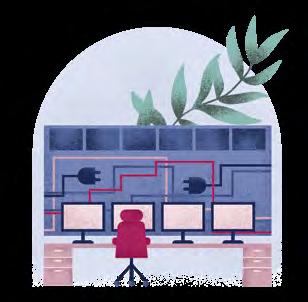
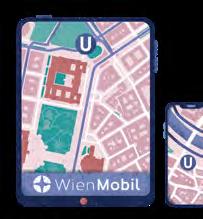
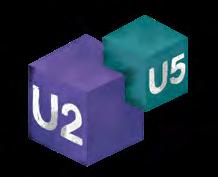
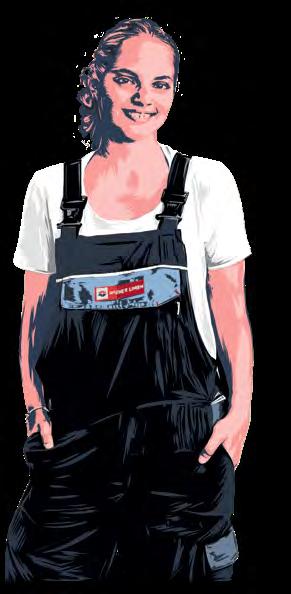
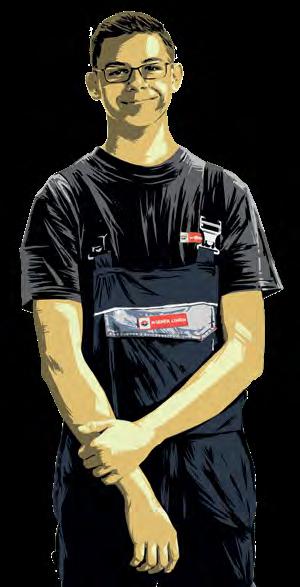
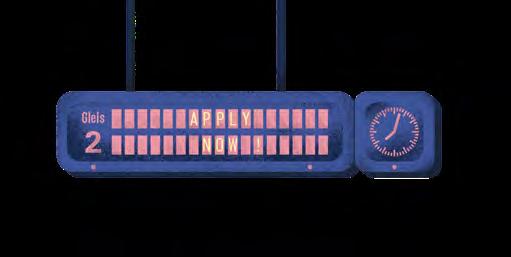
16,028 employees 1 keep Vienna running –and this figure will grow. The Wiener Stadtwerke Group is the employer for everyone who wants to use their mind and heart for the climate future of the city. We are fair and reliable, appreciative and diverse, hard-working and networking, innovative and forward-thinking. Together, we can tackle the climate revolution.
Our vision, our strategy
Our HR vision looks at the bigger picture. We grow from our challenges and position ourselves as an attractive employer in Vienna that offers a unique variety of jobs and development opportunities. We want to show that working at Wiener Stadtwerke is a great idea. Within our HR strategy, we define areas of action that are most relevant for the entire Wiener Stadtwerke Group and which are taken up by the Group companies and addressed individually. This means that everyone is working towards the same goal while also enacting their own measures that are adapted to their specific challenges. This connected approach and successful cooperation of our Group companies are at the core of our HR strategy.
General societal trends such as the lack of workers and specialists, the still low number of women in technical jobs and an upcoming wave of retirements due to demographical shift will have a profound impact on our HR activities in the coming years. In the Group-wide strategic HR planning, we combine these trends with possible scenarios for how our business areas will develop. This allows us to simulate our long-term personnel needs. We develop appropriate HR initiatives based on this relevant foundation for decision making. The HR departments of the individual Group companies then support their implementation as our strategic partners.

In the current employer branding strategy of the Wiener Stadtwerke Group, we couple the topic of public services for the metropolitan region of Vienna with an eye toward
the future in terms of climate protection and sustainability. We are proud that we keep Vienna running and are the driving power behind the climate revolution –those who work for us are working on behalf of a great city and its people. Because we have the most need for people in IT and technical areas, we target these groups specifically with creative activities and measures. In the past financial year, we also expanded our job ambassador programme with a focus on IT staff by one generation. After a compact internal training course, our job ambassadors help to gain new employees for the Wiener Stadtwerke Group. As part of our strategic cooperation management, which we are in the process of expanding, we finance IT degrees at the FH Campus Wien university of applied sciences, among other initiatives. The accompanying programme provides students with an insight into the IT landscape of the Wiener Stadtwerke Group. We are continually expanding our portfolio of HR marketing activities. The ongoing optimisation and modernisation of the application process, for example with virtual interviews, the use of video recruiting, creating a sustainable active sourcing strategy and the implementation of a new applicant management system, is also a high priority. We use active relationship management and tool-assisted community building for sustainable recruiting. Our target-group oriented recruiting is divided into commercial, technical and IT areas. This allows the individual recruiting teams to get to know the target groups better and tailor the application
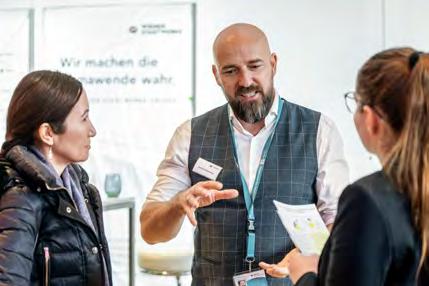 1 Of these, in 2022 an average of 15,314.6 were full-time workers and 668.1 part-time. This data was assessed at the end of the year in full-time equivalents.
1 Of these, in 2022 an average of 15,314.6 were full-time workers and 668.1 part-time. This data was assessed at the end of the year in full-time equivalents.
process. As Job Guides, we advise applicants on job opportunities in the speciality areas throughout the entire Wiener Stadtwerke Group. During the application process, we aim to ensure resource-efficient handling and an authentic external appearance.
Our slogan “Together we will make the climate revolution a reality” is used in both internal and external campaigns to attract current and future climate pioneers. In 2022, we held a Climate Pioneers contest, casting a light on our employees and their contributions to climate protection. The contest illustrated in an impressive fashion that climate protection in the Wiener Stadtwerke Group isn’t just the task of a few individuals working on lighthouse projects. Quite the contrary: there’s a climate pioneer in all of us. The winners of the contest were presented visibly throughout the city: on advertising boards and a specially made mural. With our climate protection programme, the first of its kind, we are specifically addressing young talent wanting to contribute actively towards the climate revolution. In the 18 months of the programme, the trainees get to know at least three of the
Wiener Stadtwerke Group companies closely, joining in right from day one and gaining deep insight into topics that are relevant for the climate.
In 2022, 175 apprentices started their training in the Wiener Stadtwerke Group: a record number of new learners. At the same time, the search for new talent was completed earlier than ever before. The foundation for this success is the Group-wide collaboration in the centralised apprenticeship management and thus all Group companies that provide apprenticeships. Our shared goal is to counteract the lack of specialist workers and to find young employees who will remain in the Wiener Stadtwerke Group for a long time. It is particularly pleasing that the new students in 2022 include 30% girls in technical / mechanical jobs, up from 18% in the previous year. The apprenticeship marketing received the gold “Brand 4 Young Talents” award for the second year in a row. Speaking of awards, the companies of the Wiener Stadtwerke Group that offer apprenticeships received the seal of quality “TOP-Lehrbetrieb” (“TOP apprenticeship workplace”) again in 2022, showing that we offer top-notch training.
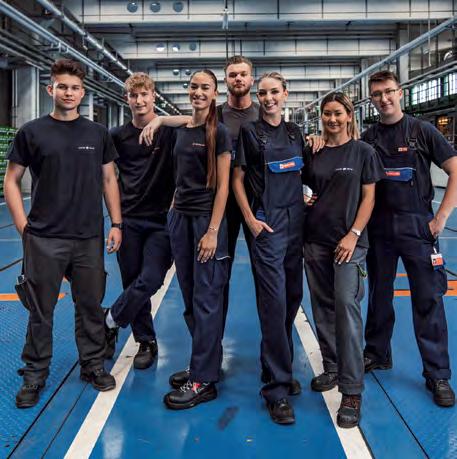 Roughly 500 apprentices are trained in the Wiener Stadtwerke Group.
Roughly 500 apprentices are trained in the Wiener Stadtwerke Group.
“As climate protection trainees, we are here to create more awareness and spread knowledge about climate protection and sustainability matters. We do this, for example, by creating a Group-wide climate community. Together we reveal potential for improvement, give suggestions for solutions and offer a platform for existing sustainability measures.”
Manon Christine Oschounig, Climate protection trainee
Our corporate culture
Values, standards and approaches shape how work is carried out in an organisation, how it acts and makes decisions. This corporate culture – also in the Wiener Stadtwerke Group – has been subject to enormous external influences and shifts for a long time. And if the environment changes, we also need to develop our corporate culture accordingly –always in line with our corporate vision. Only then will we be able to rise to the challenges of the future. To shape the change, we use instruments and methods that make it possible to gain an outside perspective of our companies, to reflect and to engage in dialogue. Initiatives like the Groupwide employee survey help assess our staff’s perspectives and to tailor our actions. Roughly 12,000 employees took part in the survey conducted in 2022. That makes up 75%
75% of our employees took part in the employee survey conducted in 2022, 17% more than in 2019.
of our staff and thus 17% more than in 2019. The results show a high level of commitment among the employees (82% agreement), and the Wiener Stadtwerke Group as an employer is rated very positively (73% agreement). Both key figures improved over the last survey in 2019. The compatibility of work and private life was the only topic that was viewed more critically than in the last survey (63% agreement, minus 4%) and is now being addressed throughout the Group with a variety of initiatives. We want to improve here.
Even seemingly small measures such as an appreciative employee orientation chat or events that reflect our leadership principles contribute each and every day to developing our corporate culture toward our corporate vision.
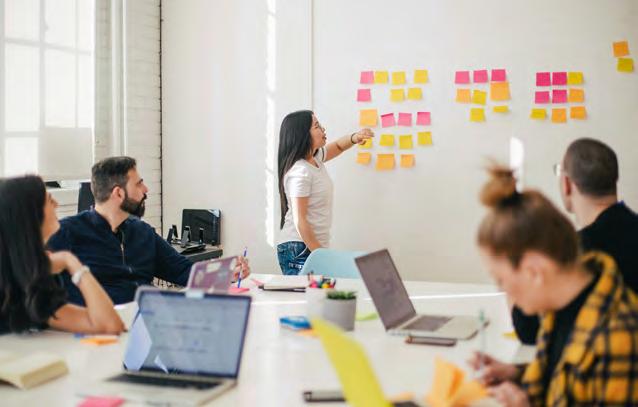
Development means change, and this needs to be accompanied in the company, especially in challenging situations. The Change Management department, created in 2020, and the corporate culture have become established as a cooperation partner, supporting the management in Group-wide projects such as coaching sessions, workshops and other formats that facilitate dialogue and exchange. To further bolster change management as a specialist discipline and develop the skills of experts, we have carried out the Change Management Compact qualification annually since 2021. This tailored training concept supports executives and experts in shaping, accompanying and steering change processes in the organisation and helps to fine-tune the shared view of the corporate culture.
At Wiener Stadtwerke, change means shaping transformation together.The Wiener Stadtwerke Group supports employees and executives in their continuing education and training 2 of their expertise with a diverse and Group-wide training programme. The digital transformation offers many options for individual development such as e-learning formats or online training, and it enables self-led and self-determined learning for our employees. By regularly taking part in training courses, our executives and employees learn specialist knowledge as well as new patterns of behaviour and thinking while also gaining opportunities to network across the Group.
The leadership skills and abilities of our executives are bolstered by a diverse educational offering. As the operating executives face particular challenges in their role as the link between management and employees, we have adjusted our programme for them accordingly in 2022. In 2023, our education centre will also be made fit for the future of work and learning. Open-plan spaces for flexible settings and events
2 Our employees spent an average of 3.13 days in training in 2022.
will create the optimal conditions in which creativity and cooperative learning and working are fostered.

The companies of the Wiener Stadtwerke Group are increasingly counting on workplaces and times becoming more flexible. In addition to the option to work part-time, there are two working time models that are most common. The flexitime model lets employees set their own working hours within a defined framework. The building block model is based on an annual calculation of working hours and makes it possible to tailor working hours to meet both the needs of the employee and the company’s operational requirements. Employees who are starting a family are supported in various ways, such as the optional “baby month” and needs-based parental leave and part-time options. In 2022, 185 women and 146 men made use of parental leave (incl. a family time bonus). For employees who are also carers, there is also the option to take a leave of absence or reduce working hours. Some companies in the Group offer sabbaticals and allow employees to take a leave of absence
or work part-time to continue their education. Partial retirement makes the transition to retirement easier. Most of the Group companies are certified with the state-authorised “Beruf und Familie” (“Work and family”) seal of approval for their HR policies that take families and life stages into account.
Due to the different contractual relationships of our employees, the Group management and the Group companies have a Staff Council (for permanent civil servants and contract staff) and a Works Council. 70% of our employees are part of a collective bargaining agreement; the other 30% are permanent public servants and contract staff. The HR representative upholds the interests of the employees with the employer and informs them of key structural developments or changes in employment, remuneration and retirement law. The core task of the Works Council is to represent the interests of employees vis-à-vis the management. The elected members of the Works Council ensure that all provisions under employment law are observed. The collective agreements, corporate agreements and transparent remuneration models all ensure appropriate pay. Wiener Stadtwerke largely provides permanent contracts. The exceptions are internships and those replacing workers who are on temporary leave. The employees and their representatives are informed of major corporate changes promptly.
Vienna is multifaceted. Wiener Stadtwerke reflects this. The diversity of more than 16,000 employees and millions of customers in the greater Vienna metropolitan area is an opportunity for the entire Group. But unlocking the full potential of this opportunity requires corporate structures, processes and a clear stance that combats discrimination and fosters equality.
Since the start of 2022, the diversity committee of the Wiener Stadtwerke Group, which is made up of representatives from the Group companies and relevant specialist departments throughout the Group, ensures that the topic is anchored in the structure. The newly developed diversity strategy of the Wiener Stadtwerke Group will provide the
direction in future. It lays out the conditions for professional and sustainable diversity management in the Group with a clear guiding principle and long-term strategic targets. The diversity committee leads with an eye toward the superordinate strategic goals and pursues the achievement of goals.
Three diversity aspects are particularly important here:
Considering the generations is highly relevant at Wiener Stadtwerke, not only because of the impending demographic shift in the staff. Older employees have valuable organisational knowledge while younger generations increasingly bring the latest developments and trends to the Group. In addition to a variety of measures for obtaining further qualifications, promoting health, working models and continual learning, we collaborate with external institutes to not only encourage older employees to remain in the company for longer, but also to create an attractive working environment for younger and future employees. Mutually agreed reduction of regular working hours to partial retirement gives our employees the option to make their transition into retirement smoother. This helps to ensure that knowledge remains in the company in the long term.
Approximately 350 employees with disabilities are making a valuable contribution to the success of Wiener Stadtwerke. We place a particular emphasis on fostering talent and skills in collaboration with relevant stakeholders from this area. The Group-wide accessibility guideline sets new standards and a unified guide with a view toward accessible customer orientation. This report contains a chapter dedicated to accessibility.
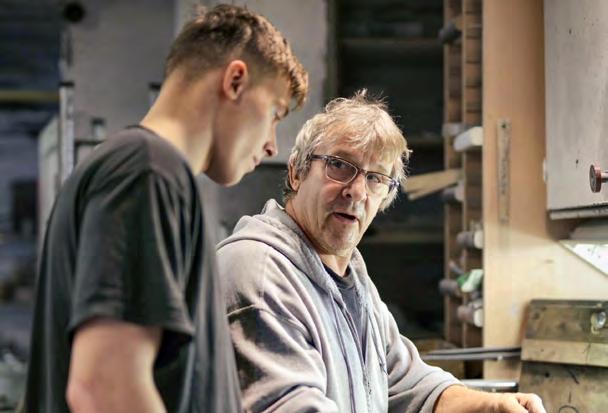
Wiener Stadtwerke is there for everyone – regardless of gender. A new linguistic guideline creates clarity and regulates the use of gender-inclusive language in the Wiener Stadtwerke Group. We don’t just pay lip service to gender equality, though. A Group-wide equality guideline has been in place since 2017 to set out clear conditions and targets and to ensure, for example, that regular monitoring takes place. We strive for an equal balance of women and men. We want to achieve this goal by defining an action plan to foster this. In hiring and promotion decisions, preference will be given to the under-represented gender if the candidates have the same qualifications. Our promotion of gender equality also becomes evident through measures in apprenticeship management, employer branding and various collaborations. Women’s networks provide opportunities to connect and share experiences. The success of these efforts is shown in the continually growing proportion of women in the Wiener Stadtwerke Group over the past years.
We have a close eye on the needs and requirements of all generations
Occupational safety is a high priority for Wiener Stadtwerke –we won’t hand off responsibility for this important topic to someone else. Our goal is to avoid all damage for humans in the long term and to ensure a consistent culture of safety in our company. We have installed an employee protection
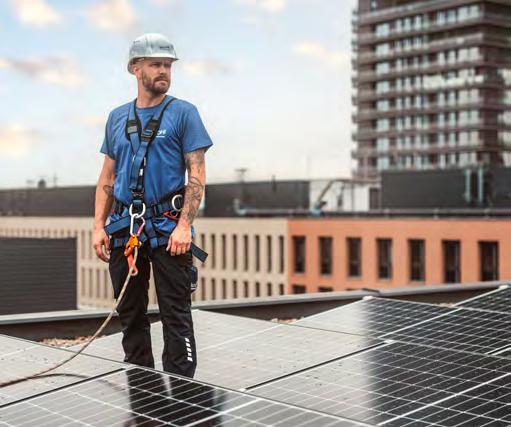
council within the Group that meets at least once per year and as needed. The aim is for prevention specialists from all subsidiaries to discuss relevant topics in the areas of occupational safety, health, and accident prevention to continuously improve the protection of the staff. This allows synergies to be identified and utilised. These have included holding joint fire-fighting drills, coordinating training for prevention specialists or standardising recurring instructions. The employee protection is organised decentrally. All Group companies fulfil the legal requirements for occupational health and safety. In addition, the Group companies that primarily carry out mechanical activities use a modern occupational health and safety management system3 in accordance with ISO 45001, which is also the subject of continual internal and external audits.
Occupational physicians, occupational psychologists and security personnel are responsible for advising Wiener Stadtwerke and its employees in all matters of occupational safety as well as maintaining and promoting health in the workplace, making work humane and preventing workrelated illnesses.
The health of its employees is of paramount importance to Wiener Stadtwerke. The comprehensive occupational health management system is based on a three-pillar model: prevention, aid and follow-up. This three-pillar model should actively contribute to the health of the employees
3 A management system for occupational health and safety has been introduced in the following companies: Wien Energie, Wiener Netze, immOH! (previously Facilitycomfort), Wiener Linien, Wiener Lokalbahnen and Wiener Lokalbahnen Cargo.
and maintain this in the long term. The occupational health management system is oriented on the strategic aims of the Group and pursues the following Group-wide goals:
• Supporting, improving and maintaining employees’ ability to work
• Reducing absences due to illness and the number of occupational accidents
• Improving employee health literacy through appropriate health promotion measures
• Gradually reintegrating employees who have been on long-term sick leave
Occupational Reintegration Management supports employees who have been on long-term sick leave and helps employees who have temporarily only been able to carry out some of their previous activities due to health-related limitations to slowly return to their full workload. Occupational Health Promotion supports the health and personal health literacy of employees in their professional and personal lives. The services are varied and cover topics such as healthy eating, getting regular exercise and supporting mental health matters.
As the areas of activity are very diverse within Wiener Stadtwerke, the implementation is the responsibility of the individual Group companies; the Group management actively supports the implementation of and adherence to the standards which were defined together. To do so, a Group-wide occupational health management (OHM) workgroup was implemented. Our Group-wide e-learning course “OHM – managing missed days healthily!” aims to increase awareness among executives for missed days.
Information that is relevant throughout the Group is approved with the companies of our Group and sent out to employees by Corporate Communications. The latest information about health and safety in the workplace is communicated via the companies’ intranet.
for employees are essential here. Employees at the TownTown location also have an occupational doctor’s surgery available to them, which they can also visit during working hours. Easy access to prescriptions and referrals save time and make it easier to combine work and family life.
Wien Energie supported the health of its employees with a wide range of offers on Health Day 2022
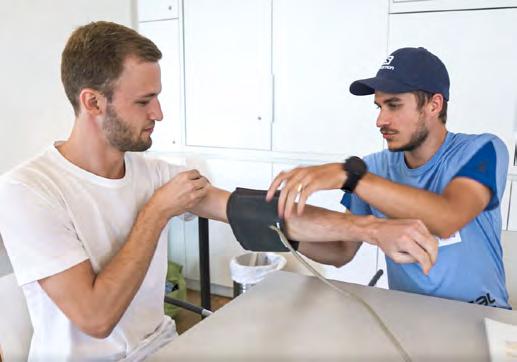
At Wiener Stadtwerke, training courses are held regularly on workplace safety (initial and follow-up instructions), health protection and fire prevention. The topics vary greatly due to the diversity of Wiener Stadtwerke, starting with guidance on desk jobs and the dangers of train operations through to rope rescue training, which is partially also carried out by external service providers.
The services of the public health office, which is only responsible for the municipal employees within Wiener Stadtwerke, include examinations in line with public services law, determining whether an individual is fit to work, and placing someone into early retirement. Consultations and support
“The health and safety of our employees has the highest priority at Wiener Stadtwerke. We spare no cost or effort to ensure this.”
Karin Korn, Health Management Wiener StadtwerkeA detailed overview of the role of the Wiener Stadtwerke Group as an employer can be found starting on page 61 of the Annual Report.
We shape products and services. We define living spaces. We develop infrastructure, supply and communications pathways. For whom? For the metropolitan region and everyone who lives there. That’s a big task. The responsibility we bear is not a burden for us but an incentive. The Wiener Stadtwerke Group always wants to be better for its customers, more service-oriented, more innovative and more sustainable. Simply put, close to the people. That’s the way we see it.
The Accessibility Team has been in place since summer of 2022, led by the Group Accessibility Officer of the Wiener Stadtwerke Group. The team is the central communications hub and advises the leadership, (department) heads, project leads and other decision makers throughout the Group with its expert knowledge regarding accessibility, treatment of people with disabilities and the varying needs.
The task of this team is to introduce and support measures throughout the Group so that all customers with or without disabilities are able to use all offerings in the same quality. The Accessibility Team is in constant dialogue with the companies of the Wiener Stadtwerke Group.
The professional responsibilities of the Accessibility Team are based on three pillars:
• Accessibility for all customers of the Wiener Stadtwerke Group
• Increasing the number of employees with disabilities
• Communication within the Group management, with the Group companies, with representatives of people with disabilities as well as the media
Accessibility projects include:
The Wiener Stadtwerke Group is the most important infrastructure services provider in the city and aims to provide access to all products and services for all its customers – with or without disability – without barriers and through all life stages.
• The new underground trains of Wiener Linien (X-Wagen)
• The new Wiener Lokalbahnen vehicle (TW500)
• The sign language avatar for real-time information at Wiener Linien
• The new accessibility concept of the car parks
• The first accessible electric ride service bus of Wiener Lokalbahnen
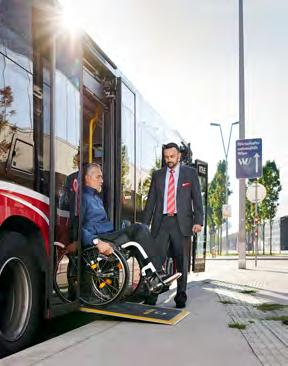
Ensuring a sustainable and reliable energy supply for all the people of Vienna is a key objective for us. Since 2011, a dedicated team at Wien Energie has been focusing on helping those in particularly challenging economic circumstances. Our close collaboration with social institutions allows us to find tailored solutions for each individual case. In 2022, the Wien Energie ombudsman’s office for cases of hardship assisted 561 customers in the Heating division and 6,492 in the Electricity / Gas division. The Wiener Netze ombudsman’s office for customers with financial hardship assisted 243 customers in the reporting period.
The pricing of Wiener Linien is not only affordable and fair, but also offers special rates for people on low incomes so that the public transport system can be used by everyone. Special offers are available for children, basic military personnel and persons with a social pass, pupils, apprentices, students with their primary residence in Vienna and senior citizens. Annual travel pass holders may take a dog with them free of charge – a particularly helpful offer for blind or severely visually impaired persons.
Our customers put their trust in our products and services. We ensure that these are safe, sustainable and environmentally friendly. Possible negative effects are reduced to the minimum. There were no breaches of the regulations or voluntary rules for behaviour that serve to avoid impacts on health and safety in the reporting period. There were also no reported violations in labelling and product and service information.
Wiener Stadtwerke regulates the data protection organisation and IT security by specific Group guidelines. The General Data Protection Regulation (GDPR) and other legal regulations such as the Austrian Data Protection Act (DSG) are also relevant for the Group. In addition, each Group company has its own
individual standards regarding data protection processes. Each Group company has at least one person who is responsible for ensuring that personal data is processed in accordance with data protection regulations. Each Group company has established standardised data protection processes that regulate how data protection queries are responded to and how data breaches are handled. Training measures such as our annual e-learning course with special areas of focus – from phishing emails to rules for conduct in a mobile workplace – offers in the education programme and regular posts on the intranet. All these help to raise awareness among employees about data protection.

We want to continually develop our data protection organisation. To this end, votes are held among the data protection officers when necessary and the data protection working group meets regularly. There is also a cross-company data protection committee that is tasked with protecting employee data. Data protection is taken into consideration when new IT applications are rolled out. In the reporting period, we created a cloud governance and a Groupwide deletion strategy. A specific, documented process for handling data breaches – cases where there has been a breach of personal data – has been introduced in each Group company. Data breaches are to be documented and, where applicable, reported to the data protection authorities. In 2022, there was one case of a data breach involving customer data that required reporting in the Wiener Stadtwerke Group.
Wiener Stadtwerke manages large amounts of data of various types and origins, containing invaluable information for our business. Consistently and purposefully preventing the loss, falsification, manipulation and undesired disclosure of this data requires a stable IT infrastructure that works round the clock and capable, cost-effective IT support. Binding regulations for information security in critical infrastructures were established with the introduction of the Austrian Network and Information Systems Security Act (NISG), which sets out the requirements for a high level of network and information system security. Wiener Stadtwerke is subject to these provisions in certain areas. Our IT security organisation and IT security standards are based on the ISO 27001 standard, supplemented with special industry-specific requirements. All of the services provided by WienIT for the Wiener Stadtwerke Group fulfil this international standard.
WienIT keeps up IT security. The organisation and all services of WienIT maintain the highest security standards. This is verified by TÜV AUSTRIA through ISO 27001 certification. We also handle personal data responsibly in the cloud. WienIT is now also ISO 27018 certified.
We provide products and services, make a vital contribution to creating public value and secure jobs for more than 16,000 employees. That’s a lot, but it isn’t all we do.
We influence the lives of many more in the surrounding areas and further away. This includes the people in our supply chains, the local communities that are affected by our business activities, and the many creative artists, sports clubs and other organisations we sponsor.
The Wiener Stadtwerke Group places increased emphasis on sustainability aspects in procurement. For this reason, an additional guideline was created in 2022 to supplement the current Group-wide contract awarding policy. It will go into effect throughout the Group in 2023. The guideline defines Group-wide practical instructions for an ecological, social
and environmentally friendly procurement process. For example, sustainability criteria should be used as a matter of priority in the statements of work. Sustainability criteria will be mandatory for supply and service contracts with an estimated value of more than EUR 150,000 and with construction contracts of more than EUR 1m.
By purposefully procuring sustainably produced goods and services, we can make a significant contribution to ensuring a positive ecological & social impact of our procurement and business activities. We have a lot of leverage here: the green transformation starts with procurement.
At the same time, sustainable procurement influences external value creation through the supply chains. The Groupwide guidebook for allocation already stipulates that “taking into account the available budgetary framework, innovation-based, social and / or ecological aspects as part of the procurement process are to be considered in particular to the extent that this is possible and
appropriate based on the selected process and / or the subject of the contract.” In addition, the Federal Allocation Act of 2018 stipulates that environmental suitability must be taken into consideration and social as well as innovative aspects should also be considered.
The new guideline also stipulates that the relevant sustainability criteria are to be identified by class of goods for each Group company and that the procurement process should be optimised accordingly. The priority here is achieving green procurement. The eco procurement criteria of the City of Vienna are to be used primarily. The Group companies need to assess which eco procurement criteria are to be applied as part of a concrete procurement process and based on a specific group of goods. The Group companies are, however, free to orient themselves to
their own sustainability criteria. In collaboration with our suppliers and contractors, we plan to continue updating the criteria relating to sustainability and the circular economy.
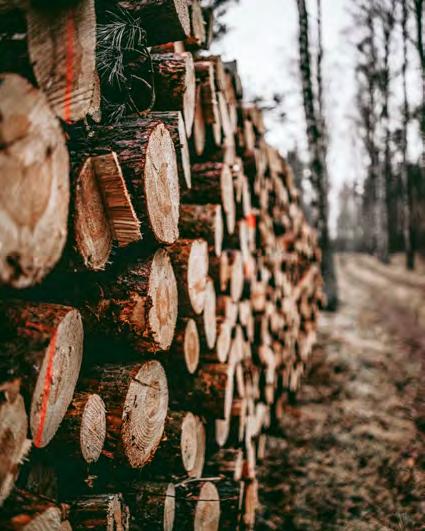
The Wiener Stadtwerke Group views its corporate activities holistically. We always consider the interaction of our activities and decisions with the environment and our society. This includes always having an eye on the effects on local communities. As such, Wien Energie is driving forward initiatives such as solar power stations for citizens. We generally try to avoid negative effects. If this is unavoidable, we aim to keep the impacts to a minimum. Our Group com-
pany Wien Energie, for example, regularly evaluates and observes the direct and indirect effects of its activities on the affected communities as part of the environmental management in accordance with ISO 14001 and in line with the Eco-Management and Audit Scheme (EMAS).
Wiener Linien is carrying out inner-city construction that is unusual in its size and scope as part of its U2xU5 public transport expansion. We want to implement the largest climate protection project in Vienna with as much goodwill as possible from those living nearby and other stakeholders. We work on this daily. Our U2xU5 ombudsman’s office plays a significant role here. A team of communicators and technicians is available by phone, email and on-site at the construction site. Providing information personally is particularly effective for preventing conflicts. We also try to adapt the construction to the greatest extent possible to the needs of the surrounding areas.
Wiener Netze, whose focus is on good cooperation and maintaining a high quality of life, also plans necessary construction so that these cause as little interruption to daily life as possible. If, for example, the construction will take place near an allotment garden area, attempts are made to schedule this work for the autumn months so that our customers can enjoy the summer in the fresh air with little noise or pollution. We also keep an eye on events that we do not have control over. The ombudsman’s office of Wiener Netze, which has been in place since 2018, handles the specific assistance for customers experiencing financial hardship. We want to offer our customers safe and worry-free supply, even in difficult times. That also means
excluding certain systems from planned downtimes if medical or life-supporting devices are installed in a household. This allows us to protect the health of our customers. At present, 21 customers who rely on life-saving medical devices in their homes are receiving energy.
As the owner of numerous historic and culturally significant buildings and cultural artefacts, the Wiener Stadtwerke Group operates two museums: the Vienna Transport Museum Remise at the former Erdberg depot and the Funeral Museum at Vienna’s Central Cemetery. Historic stations and bridges of the former Vienna Stadtbahn, the six Jugendstil stations of what is now the U6 line, the Spittelau
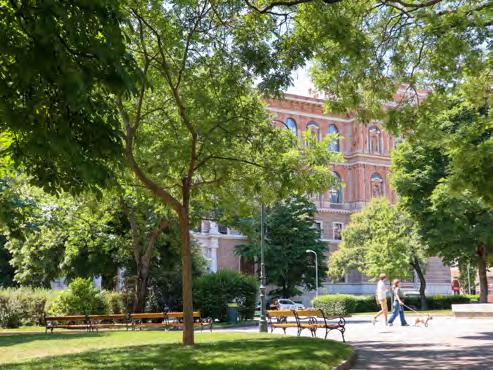
“Especially in the city, people don’t have the option to install their own solar panels. Our solar power stations for citizens allow people to take an active role in the climate revolution and to benefit from solar power.”
Michael Strebl, Chair of the Management Board Wien Energie
energy-from-waste plant, and the Favoriten transformer station all speak of the cultural history of the city. We have also sponsored the Vienna Museum and the Vienna MuseumsQuartier for a number of years.
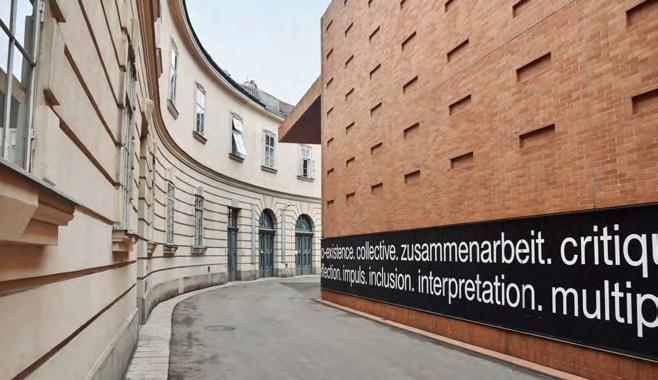
The sights and sites that draw thousands of tourists to Vienna every year include the countless graves of honour, honorary and historic gravesites of Friedhöfe Wien. They are part of the cultural history of Vienna and represent a high accolade for the lives of those who are buried within them. Friedhöfe Wien GmbH sees itself as the keeper and transmitter of cultural treasures. It is therefore also of special interest to the company to support the local cultural scene and provide a space for it. Roughly 50 film and photo productions were carried out in 2022 – everything from major film projects, documentaries and segments for public radio to photo shoots and student
projects. Concerts, readings, family gatherings and cemetery tours address the topic of death and mourning from different perspectives and help to break down taboos. Sometimes it’s good to have a bit of humour. The products in the cemetery shop include t-shirts that read: “Vienna Central Cemetery –Best place to be!”
Wiener Linien offers the people of Vienna and visitors unexpected art and cultural experiences. More than 100 stations of the underground network contain over 30 works of contemporary art and historic artefacts. The U1, U2 and U3 lines in particular are Vienna’s “art lines”. In addition, Wiener Linien regularly provides public space for art. Since 2008, it has been cooperating with Kunst im öffentlichen Raum GmbH (KÖR) of the City of Vienna to structure the allocation and implementation of art projects together. For five years, the U-Bahn-Stars have been providing live music in select underground stations in Vienna. Additional information about the cultural history of public transport in Vienna can be found in the corporate blog of Wiener Linien.
The focus of Wien Energie’s cultural promotion is on music, literature and the performing arts. Wien Energie is also a partner for events such as the Donauinselfest music festival and the Wiener Eistraum ice-skating experience on the Rathausplatz square. Our commitment to culture is seamlessly coupled with
our support for regional associations and events and for social projects. Wien Energie focuses here on sports and, for example, supports running events like the Vienna City Marathon and the Wien Energie Business Run.
were carried out in 2022 –from major film projects, documentaries and segments for public radio, to photo shoots and student projects.
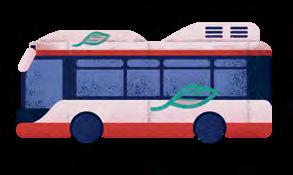
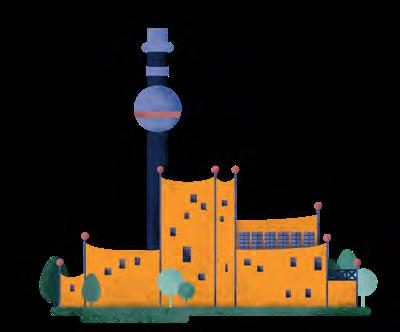
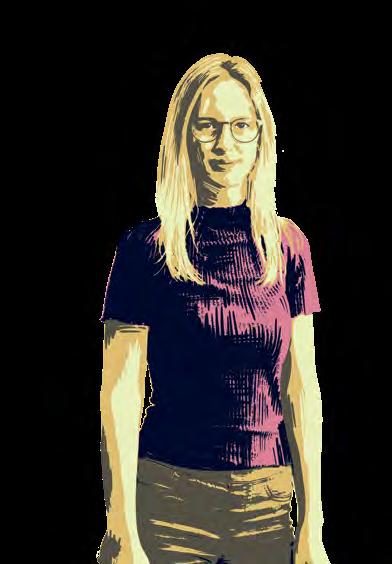
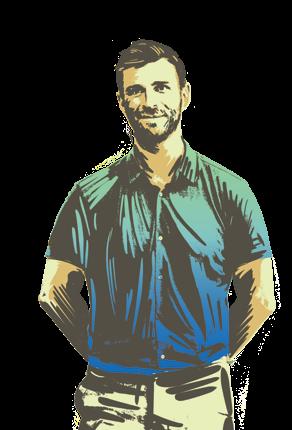
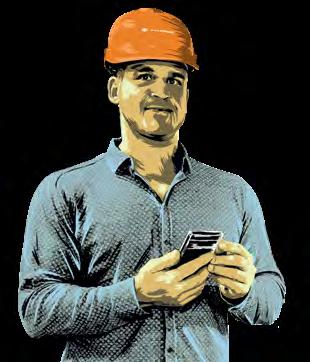
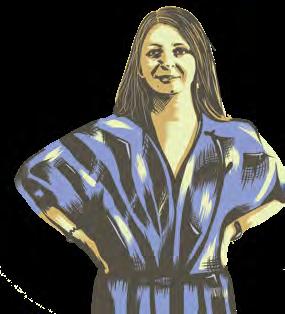
The Wiener Stadtwerke Group knows how to keep Vienna running. And it knows how to lead our liveable city into a good future. Its task is to provide services to everyone in Vienna and drive the climate revolution forward in a targeted manner. It achieves this through a great deal of expertise and passion, targeted investments, and the support of a strong Group.
goals, for example, will be incorporated into the management compensation of the Wiener Stadtwerke Group.

A transparent structure is essential in order to fulfil the changed requirements that the CSRD stipulates for companies. It is a requirement for corporate management in accordance with ESG criteria that are of a high strategic relevance for Wiener Stadtwerke. Important here is that the definitions, indicators and targets are transparent and standardised throughout the Group. Progress on these must be reportable to Group management through unified interfaces. We will therefore optimise our sustainability management accordingly and create an organisational structure in 2023 that redefines the responsibilities, roles, tasks and processes in ESG / sustainability.
Transparent corporate structures and processes give the owner, supervisory bodies and public insight into the economic activity of the Group. An internal control system ensures early detection of potential sources for risks and failures in business processes that could have negative economic, environmental and societal consequences. Responsibility for the risk management processes lies with the Group companies and the individual risk stakeholders from the areas of ICS, financial risk management, IT security and compliance as well as the risk stakeholders of the different divisions in the superordinate Group risk management.
The Corporate Sustainability Reporting Directive (CSRD) passed by the EU parliament in 2022 brought fundamental changes to the type and scope of sustainability reporting of the Wiener Stadtwerke Group – and many other companies. The existing regulations for non-financial reporting were expanded considerably. For example, our management report is to contain not only financial indicators but also non-financial indicators. These are presented in a shared context. This comprehensive view enables future-oriented corporate leadership. In the long term, ecological and social
In addition to the changes in the organisational structure, Wiener Stadtwerke is also carrying out further measures to ensure that the management of sustainability matters receives the attention it deserves: front and centre. We conducted a climate risk analysis for the first time in 2022 (for more information, please refer to the section ‘We want to know our climate risks’). We will carry out this analysis annually in the future and will report the results regularly in the Group-wide risk management. We are also changing our current risk management guideline and our risk strategy. Unlike in the past, both will also comprise sustainability aspects. To ensure comprehensive risk management, a monthly exchange takes place with all risk stakeholders at the Group level from the internal control system (ICS), financial risk management, IT security and compliance.
Responsibility for the risk management processes lies with the Group companies and the individual risk stakeholders from the areas of ICS, financial risk management, IT security and compliance as well as the risk stakeholders of the different divisions in the superordinate Group risk management.
Beyond this, our internal Group auditing function conducts regular audits to ensure that the principles of profitability, purpose, security, correctness and conformity with rules and regulations are observed in all work processes. It provides independent and objective auditing and consulting services that are aimed at creating added value and improving business processes. It measures the effectiveness of the risk management, the ICS, the controls and management and supervisory processes in a systematic and targeted manner, and it helps to improve these. The Group audit division this plays a key role in helping our organisation achieve its goals. The audits are carried out based on the corresponding annual audit programme, which is approved beforehand by the heads of the Group management. Extraordinary audits and consultations can also be commissioned additionally throughout the year. In addition, Group audit also makes suggestions for protecting the assets of the Group companies.
The municipal constitution of Vienna provides for an audit of companies in which the City of Vienna holds a majority stake or in which it has a controlling interest. This task is carried out by the audit office of the City of Vienna. The audit reports – including the Wiener Stadtwerke report –are published online.
We adhere to laws, guidelines and our voluntary codes of conduct throughout the Group. We are supported in this by two corporate guidelines: the compliance management system (CMS) and the code of conduct (CoC).
The Wiener Stadtwerke Group code of conduct sets out binding rules for all corporate activities and decisions throughout the Group. It is based on legal stipulations and on overarching principles of fairness, responsibility and equality. The basic rule here is: “We work actively against inequality and respect the dignity and individual personality
of all people. We do not tolerate any form of discrimination based on nationality or ethnicity, gender, sexual orientation, religion, age or disability. People of equal specialist and personal qualification are treated equally.” Wiener Stadtwerke ensures that all employees are familiar with this code.

The core topics in the code of conduct are anti-corruption, financial losses due to illegal activities, losses from a failure to adhere to statutory provisions, antitrust law and handling of corporate data. These include data loss and data misuse. The code of conduct also includes topics such as procurement, asset management, equality, assessment of conflicts of interest and employment law / employee protection. Our internal control systems help to prevent breaches before they occur.
The CMS of Wiener Stadtwerke is regularly subjected to independent audits. This ensures that all tools and processes we use to ensure our adherence to the regulations are up to date, suitable, appropriate and effective. The Chief Compliance Officer (CCO) is responsible for the required continued development of the CMS. This officer reports directly to the Chief Executive Officer and Group management of Wiener Stadtwerke. Compliance officers have also been appointed across all Group companies. They report regularly to their management and also to the Group CCO. The compliance officers are also the contact person in the event of a conflict of interest. We have passed binding regulations in our bylaws to avoid such conflicts of interest. This also includes the fact that the Chair of the Supervisory Board cannot be
The fact that the positions and associations within Wiener Stadtwerke are made public in the company register and can be viewed at any time creates transparency.
As part of the annual compliance risk analysis, we assess whether and which risks of a breach of regulations exist and determine measures to reduce these. The assessment is carried out based on interviews with management, department heads and employees using a standardised questionnaire.
In the 2022 financial year, Wiener Stadtwerke GmbH was not the subject of any legal proceedings on the basis of anticompetitive activity or violations of antitrust or monopoly law. As in the previous year, there were no significant cases of non-compliance with laws and regulations which would have resulted in fines or non-monetary penalties.
No political donations were made in the reporting period.
Our compliance organisation is trained and attuned to recognise and investigate breaches. We have also set up a Group-wide whistleblowing system that meets all of the legal requirements and is used by employees, customers and suppliers. External persons can file a report using the Groupwide whistleblower platform wienerstadtwerke.at / compliance and employees can also do this via the intranet. All reports, including anonymous ones, are reviewed by the compliance officers, handled and responded to uniformly throughout the Group, for example at our customer centres.
The management teams of our Group companies receive quarterly reports, annual reports and ad hoc reports regularly from their compliance officers regarding critical matters such as appeals. A report on critical matters is made at least once per year in the Supervisory Board / Audit Committee. We are unable to publish information about the number of such critical matters for legal reasons.
The business partner code of the Wiener Stadtwerke Group that came into effect in spring 2022 defines, among other things, the social standards that we and our business partners must adhere to, for example regarding human rights and working conditions. Point 5, for example, states that: “WSTW expects its business partners to recognise the Universal Declaration of Human Rights of the United Nations and to ensure that they are not complicit or involved in human rights violations.”
We train and inform Wiener Stadtwerke provided training and instruction on compliance matters for more than 3,000 employees in 2022. All members of the Supervisory Board and all employees received anti-corruption training and are familiar with the anti-corruption policies and procedures of our organisation. We communicate regularly on compliance within the Group through various platforms – for example with an emphasis in the pre-holiday season on regulations about accepting gifts. External business partners are informed about Group-wide compliance principles in tender documents and on the websites of the individual Group companies.
to investigate all the evidence and to report on this. If a suspicion against a supplier turns out to be true, we have the right to carry out remedial action. Conversely, all business partners are encouraged to use this whistleblower system should they observe violations by employees of Wiener Stadtwerke as part of the initial business contact or the course of business.
The top ten suppliers of each Group company were informed in 2022 of the new business partner code and have confirmed their adherence to it. In addition, all contracts contain compliance regulations. We are pleased that no reports of possible risks regarding human rights have been made in the Wiener Stadtwerke Group to date. We therefore classify the risk of a violation of these regulations as very low.
wiener_stadtwerke_geschaeftspartner_innenkodexe wienerstadtwerke.at
Any compliance violations are to be reported via the whistleblower platform. The compliance officer is then required
If business partners are unable to adhere to a regulation, this must be reported in a timely manner and appropriate remedial action must be taken via partners. We reserve the right to review contracts with business partners, especially if there is suspicion that these could be in violation of our code.
Wiener Stadtwerke has been reporting transparently on its progress in sustainability for many years. Since 2004, this includes regularly publishing a sustainability report –annually since 2019. The sustainability reporting of the Wiener Stadtwerke Group comprises a consolidated overall picture of the Group’s performance. The commissioning and approval of the report’s contents is carried out by the highest level of management – the Chief Executive Officers of the Wiener Stadtwerke Group. They also assume final responsibility for the published content. Stakeholders are informed about progress on an annual basis. The most recent sustainability report, on the 2021 financial year, was published in June 2022. The information in the present sustainability report largely relates to the reporting period between 1 January and 31 December 2022. The report for 2022 has been created in accordance with the Core option of the 2021 Global Reporting Initiative (GRI) Standards. There is no external audit.
We also publish a financial report and an annual report in conjunction with this sustainability report. The financial report is focused on detailing the economic development of the Group and is primarily intended for a financial audience. The annual report provides a general overview for our

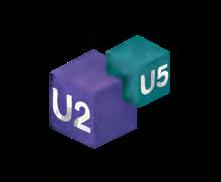
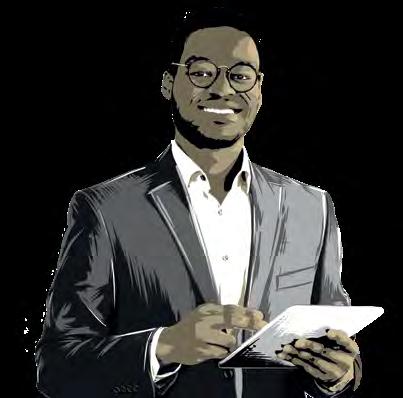
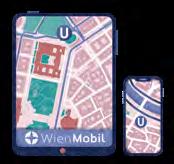
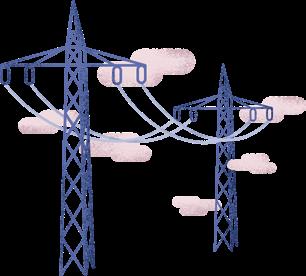
stakeholders and contains statements from representatives of the owner and from the Supervisory Board. The reports refer to each other to avoid redundancies. The reporting scope is identical for the financial report and the sustainability report. Structural changes, such as disposals, growth and mergers, can be found in the financial report.
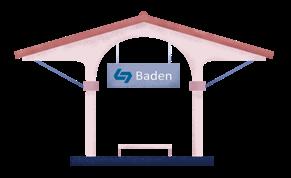
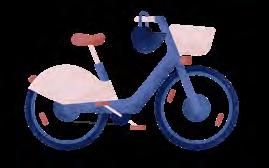
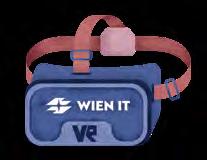
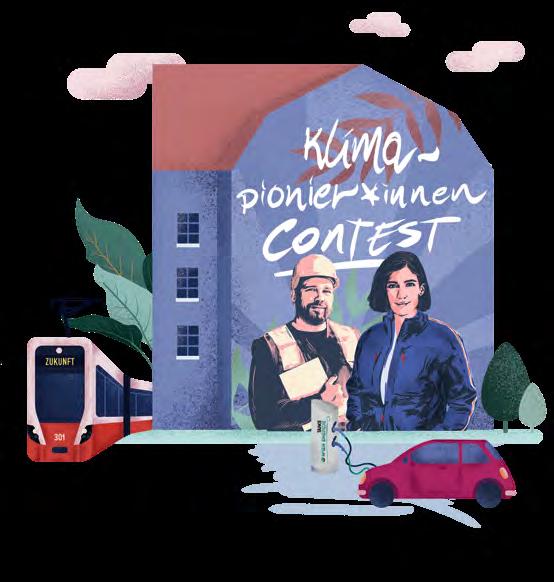
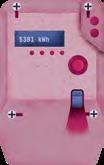
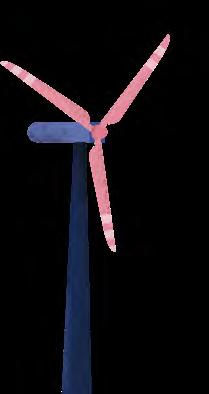
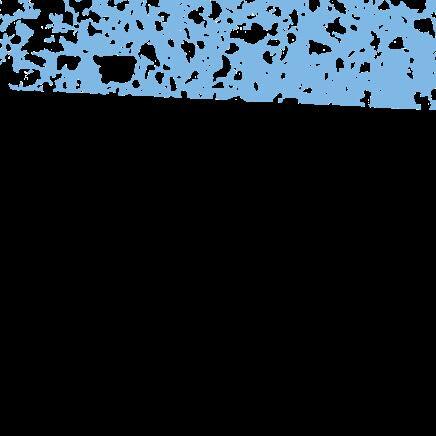

FOREWORD WIENER STADTWERKE AT A GLANCE SUSTAINABILITY ENVIRONMENT SOCIAL MATTERS GOVERNANCE ABOUT THIS REPORT
1 CO2 from continual measurement in energy from waste plants (including EfW plant in Pfaffenau) with measurement of the fossil fuel proportion or through CO2 audit in combined heat and power plants and heat plants and including CO2 emissions from electricity procurement rights.
2 Update of the key figure compared to the previous publication.
3 Output including proportional participations and procurement rights (including two-thirds proportion of biomass). Previously: Wien Energie Group view including procurement rights, without participations, but including consolidated companies – biomass at 100%, Pama-Gols at 50%, VETE 100%
Energy use and consumption
Energy sources (combustibles used for electricity and heat generation – Wien Energie)
of renewable energy sources in electricity generation (including participations, in accordance with proportional breakdown of generation with
of
sources in heat production (in accordance with proportional breakdown of generation with
4 Update of the key figure compared to the previous publication.
5 Output including proportional participations and procurement rights (including two-thirds proportion of biomass).
6 This comprises losses for the primary and secondary grids.
WIENER STADTWERKE
FOREWORD WIENER STADTWERKE AT A GLANCE SUSTAINABILITY ENVIRONMENT SOCIAL MATTERS GOVERNANCE ABOUT THIS REPORT
8 ASIDI and SAIDI values are reported from the 2019 financial year onwards. These are average values from three financial years. The presentation is valid for all publicly accessible publications and is approved by E-Control. These values are also published on the corporate website of Wiener Netze. Preliminary disclosure before ratification by the supervisory authority.
WIENER STADTWERKE
FOREWORD WIENER STADTWERKE AT A GLANCE SUSTAINABILITY ENVIRONMENT SOCIAL MATTERS GOVERNANCE ABOUT THIS REPORT
WIENER STADTWERKE
FOREWORD WIENER STADTWERKE AT A GLANCE SUSTAINABILITY ENVIRONMENT SOCIAL MATTERS GOVERNANCE ABOUT THIS REPORT
Statement of use Wiener Stadtwerke Group has reported in accordance with the GRI Standards for the period 1 Jan. 2022 to 31 Dec. 2022.
GRI 1 used GRI 1: Foundation 2021
Applicable GRI Sector Standard(s) No GRI Sector Standard is applicable
GRI standard GRI disclosures Page Comments and omissions
The organisation and its reporting practices
GRI 2: General Disclosures 2021
2-1 Organisational details 4, 59
2-2 Entities included in the organisation’s sustainability reporting 45 More detailed information can be found in the Financial Report starting on p. 5
2-3 Reporting period, frequency and contact point 45, 59
2-4 Restatements of information 47, 48
2-5 External assurance 45
Activities and workers
GRI 2: General Disclosures 2021
2-6 Activities, value chain and other business relationships 7-9
2-7 Employees 29, 49, 50
2-8 Workers who are not employees Data not yet available: Key figures are planned to be collected and reported as part of CSRD reporting.
Governance
GRI 2: General Disclosures 2021
2-9 Governance structure and composition 6, 11
2-10 Nomination and selection of the highest governance body 6
2-11 Chair of the highest governance body 43, 44
2-12 Role of the highest governance body in overseeing the management of impacts
11, 43
2-13 Delegation of responsibility for managing impacts 11, 43
2-14 Role of the highest governance body in sustainability reporting 18
2-15 Conflicts of interest 43
2-17
2-18
For the evaluation of the highest governance body’s performance in overseeing the management of the organisation’s impact on the economy, the environment and people, there are no clearly defined processes and procedures in the Wiener Stadtwerke Group to date.
2-19
2-20
2-21
6 A detailed overview of management remuneration is accessible on p. 76 of the Financial Report.
Data not yet available: Key figures are planned to be collected and reported as part of CSRD reporting.
2-28
The Wiener Stadtwerke Group and the individual Group companies are organised in a large number of industrial associations and are members of national and international interest representation organisations. It is not possible or expedient to present the memberships of the Group and the individual companies in their entirety in the context of this sustainability report.
GRI standard GRI disclosures Page Comments and omissions
Economic performance
Material topic: Climate change adaptation
GRI 201: Economic Performance 2016 201-2 Financial implications and other risks and opportunities due to climate change
Anti-corruption
Material topic: Anti-corruption
GRI 205: Antiorruption 2016 205-2 Communication and training about anti-corruption policies and procedures
Anti-competitive behaviour
Material topic: Fair competition and supplier relations
GRI 206: Anticompetitive Behaviour 2016
Materials
206-1 Legal actions for anticompetitive behaviour, anti-trust, and monopoly practices
Material topic: Use of resources
GRI 301: Materials 2016 301-1 Materials used by weight or volume
Energy
Material topic: Use of energy and energy consumption
24, 25
Employment
Material topics: General conditions for optimal work, Respect for human rights within the company
GRI 401: Employment 2016 401-3
Labour/management relations
44, 52
Material topics: General conditions for optimal work, Respect for human rights within the company GRI 402: Labour/ Management
44
GRI 302: Energy 2016 302-1 Energy consumption within the organisation 23, 24, 47–49
Emissions
Material topisc: Carbon emissions and climate change mitigation, Air pollution
Data not yet available: Key figures are planned to be collected and reported as part of CSRD reporting.
GRI 305: Emissions
2016 305-1 Direct (Scope 1) GHG emissions 20, 21, 47
305-7 Nitrogen oxides (NOx ), sulfur oxides (SOx ), and other significant air emissions
Waste Material topic: Circular economy
GRI 306: Waste 2020 306-1 Waste generation and significant waste-related impacts
306-2 Management of significant waste-related impacts
306-3 Waste generated
Information not yet available in consolidated form. Wien Energie’s environmental statement provides a good insight into a large part of the emissions.
Group-wide records in the area of waste management do not yet exist.
Group-wide records in the area of waste management do not yet exist.
Group-wide records in the area of waste management do not yet exist.
GRI standard GRI disclosures
Training and education
Material topics: General conditions for optimal work, Respect for human rights within the company
GRI 404: Training and Education 2016 404-2 Programmes for upgrading employee skills and transition assistance programmes
Diversity and equal opportunity
Material topic: Respect for human rights within the company
GRI 405: Diversity and Equal Opportunity 2016
Non-discrimination
32, 33
405-1 Diversity of governance bodies and employees 51, 52
Material topic: Respect for human rights within the company
GRI 406: Nondiscrimination 2016 406-1 Incidents of discrimination and corrective actions taken
Freedom of association and collective bargaining
Material topic: Social standards in the supply chain
GRI 407: Freedom of Association and Collective Bargaining
2016
Child Labour
407-1 Operations and suppliers in which the right to freedom of association and collective bargaining may be at risk
Material topic: Social standards in the supply chain
Information not yet available in consolidated form.
As the group of suppliers relates almost exclusively to Austria, no suppliers were identified in this regard.
GRI 408: Child Labour
2016 408-1 Operations and suppliers at significant risk for incidents of child labour
Forced or compulsory labour
Material topic: Social standards in the supply chain
GRI 409: Forced or Compulsory Labour
2016
Local communities
409-1 Operations and suppliers at significant risk for incidents of forced or compulsory labour
Material topic: Impact on affected communities
GRI 413: Local Communities 2016 413-2 Operations with significant actual and potential negative impacts on local communities
39
As the group of suppliers relates almost exclusively to Austria, no suppliers were identified in this regard.
As the group of suppliers relates almost exclusively to Austria, no suppliers were identified in this regard.
Published by:
Wiener Stadtwerke GmbH
Thomas-Klestil-Platz 13
1030 Vienna, Austria
www.wienerstadtwerke.at
Design & implementation:
Berichtsmanufaktur GmbH, Hamburg
Schleusenbrücke 1, 22354 Hamburg
+49 (0)40 430 990-80
www.berichtsmanufaktur.de
Concept & content support
Berichtsmanufaktur GmbH, Hamburg
Schleusenbrücke 1, 22354 Hamburg
+49 (0)40 430 990-80
www.berichtsmanufaktur.de
May 2023
© Wiener Stadtwerke GmbH
Photos:
unsplash / Jiamin Huang: p. 1; unsplash / Rainhard Wiesinger: p. 1, p. 26; Josef Gassebner: p. 1, p. 36; Wiener Stadtwerke / Ian Ehm: p. 1, p. 42; Andreas Jakwerth: p. 2; Fuerthner: p. 4; Tobias Holzer: p. 7; Moodley: p. 8; Wipark / Huger: p. 8;
WienIT: p. 9; Jolly Schwarz: p. 9, p. 13, p. 30, p. 34; unsplash / NEW DATA SERVICES: p. 14; unsplash / ThisisEngineering RAEng: p. 14; WE / Johannes Zinner: p. 21, p. 22; AdobeStock / Maylat: p. 23; WE / Horak: p. 24; WE / Ernst Schauer: p. 25; unsplash / Diane Theresa Hendrick: p. 27; Julian Schmelzinger: p. 29; unsplash / wocintechchat: p. 29, p. 37, p. 43; unsplash / Jason Goodman: p. 31; unsplash / JP
Lockwood: p. 32; Pexels / Andrea Piacquadio: p. 33; Newsonvideo: p. 35; unsplash / Sebastian Pociecha: p. 38; unsplash / Yevheniia: p. 39; unsplash / Arno Senoner: p. 40; Wiener Stadtwerke / Ian Ehm: p. 42
If you have any questions, please contact us:
Innovation Management | Sustainability
Gernot Sauer, MMSc
+43 664 62 31 112
gernot.sauer@wienerstadtwerke.at